Macbeth

INTRODUCTION TO MACBETH
The tale of Macbeth is one of the most powerful of William Shakespeare’s tragedies, and one which delves into the most cavernous parts of the human psyche. Written in the early years of the 1600s and later published in folio form in 1623, Macbeth follows the corrosion of a Scottish leader’s conscience and sanity after he is given a prophecy of royal ascension.
The characterization of Macbeth and his wife’s psychoses carry much of the play’s arc, but such a play would not be quintessentially Shakespearean without a heavy-handed dose of word play. The three witches who leave prescient breadcrumbs that feed Macbeth’s greed throughout the play allow Macbeth to lean heavily on the words that make up their divinations. This leads to several moments of literary quibble, in which Macbeth becomes overconfident in the witches’ prophecies of his infallibility but is denied such protection in subtle twists of linguistic meaning.
With the prophetic knowledge offered by the witches, Macbeth quickly transforms from a noble and brave Scottish thane into a regicidal usurper, whose all-consuming guilt leads to even more madness and destruction. Often cited as the darkest of William Shakespeare’s plays, Macbeth presents a unique scope into the lives of the powerful and what happens when their greed is left to fester.

DUNCAN, King of Scotland

MALCOLM, son of Duncan

DONALBAIN, son of Duncan

MACBETH, Thane of Glamis, later of Cawdor, later King of Scotland

LADY MACBETH

BANQUO, a thane of Scotland

FLEANCE, Banquo’s son

MACDUFF, Thane of Fife

LADY MACDUFF

SON of Macduff and Lady Macduff

LENNOX, thane and nobleman of Scotland

ROSS, thane and nobleman of Scotland

ANGUS, thane and nobleman of Scotland

SIWARD, Earl of Northumberland

YOUNG SIWARD, Siward’s son

DOCTOR

GENTLEWOMAN attending Lady Macbeth

PORTER

FIRST MURDERER

SECOND MURDERER

THIRD MURDEERER

MESSENGER

FIRST WITCH

SECOND WITCH

THIRD WITCH

HECATE

FIRST APPARITION

SECOND APPARITION

THIRD APPARITION
Not Pictured
MENTEITH, thane and nobleman of Scotland
CAITHNESS, thane and nobleman of Scotland
SEYTON, an officer attending Macbeth
Another LORD
CAPTAIN serving Duncan
OLD MAN
SERVANT to Macbeth
SERVANT to Lady Macbeth
Lords, Gentlemen, Officers, Soldiers, Murderers, and Attendants
ACT I. Scene I (1–12).

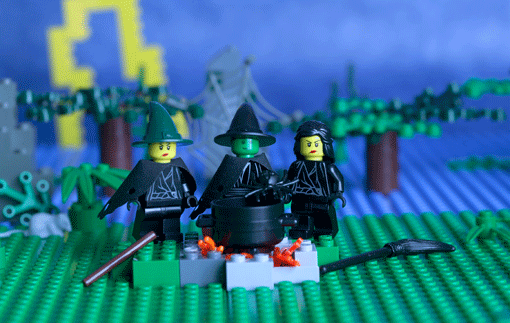
FIRST WITCH
When shall we three meet again
In thunder, lightning, or in rain?
SECOND WITCH
When the hurlyburly’s done,
When the battle’s lost and won.
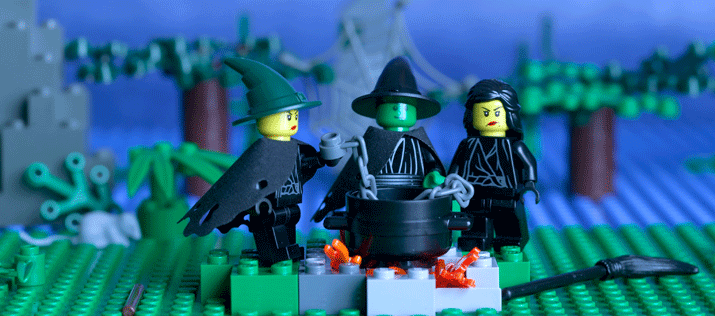
THIRD WITCH
That will be ere the set of sun.
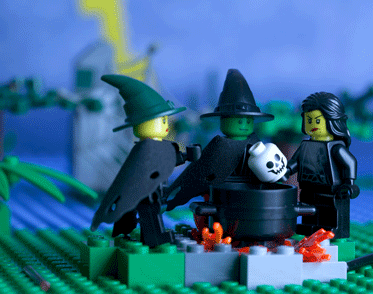
FIRST WITCH
Where the place?
SECOND WITCH
Upon the heath.
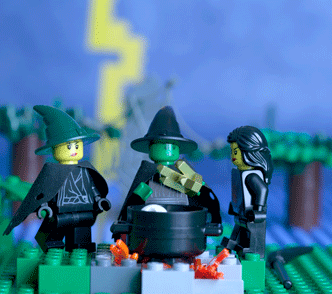
THIRD WITCH
There to meet with Macbeth.
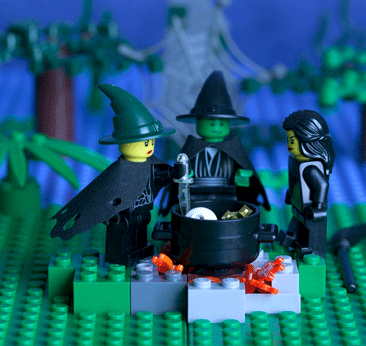
FIRST WITCH
I come, Grimalkin!
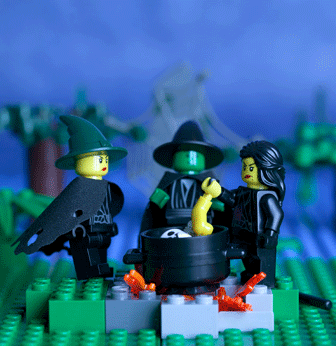
SECOND WITCH
Paddock calls.
THIRD WITCH
Anon.

ALL
Fair is foul, and foul is fair:
Hover through the fog and filthy air.
ACT I. Scene II (1–70).


DUNCAN
What bloody man is that? He can report,
As seemeth by his plight, of the revolt
The newest state.
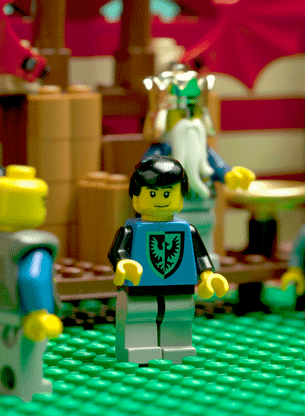
MALCOLM
This is the sergeant
Who like a good and hardy soldier fought
’Gainst my captivity.—Hail, brave friend!
Say to the king the knowledge of the broil
As thou didst leave it.
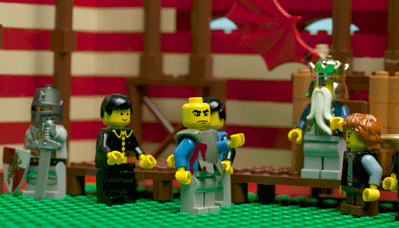
SERGEANT
Doubtful it stood;
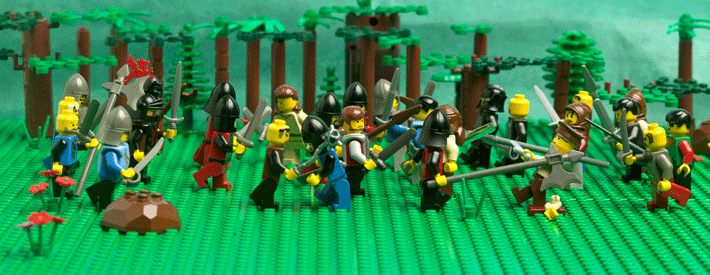
SERGEANT (cont.)
As two spent swimmers that do cling together
And choke their art. The merciless Macdonwald—
Worthy to be a rebel, for to that
The multiplying villanies of nature
Do swarm upon him—from the Western Isles
Of kerns and gallowglasses is supplied;
And Fortune, on his damnèd quarrel smiling,
Showed like a rebel’s whore. But all’s too weak:
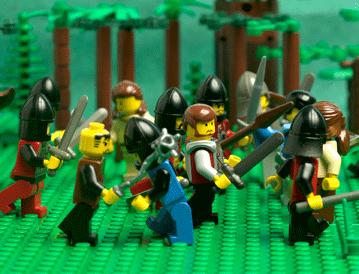
SERGEANT (cont.)
For brave Macbeth—well he deserves that name—
Disdaining Fortune, with his brandished steel,
Which smoked with bloody execution,
Like valour’s minion carved out his passage
Till he faced the slave;
Which ne’er shook hands, nor bade farewell to him,
Till he unseamed him from the nave to th’ chops,
And fixed his head upon our battlements.
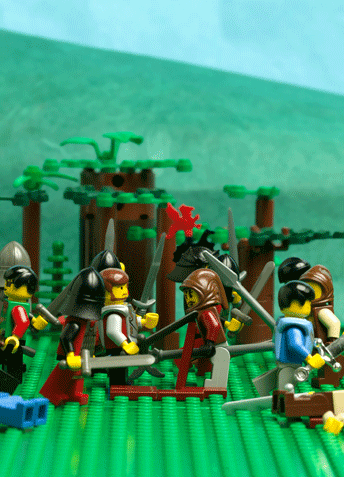
DUNCAN
O valiant cousin, worthy gentleman!
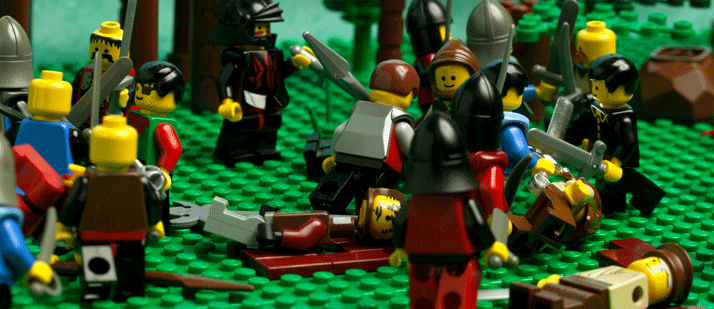
SERGEANT
As whence the sun ’gins his reflection
Shipwrecking storms and direful thunders break,
So from that spring whence comfort seemed to come
Discomfort swells. Mark, King of Scotland, mark.
No sooner justice had, with valour armed,
Compelled these skipping kerns to trust their heels,
But the Norweyan lord, surveying vantage,
With furbished arms and new supplies of men
Began a fresh assault.
DUNCAN
Dismayed not this our captains, Macbeth and Banquo?
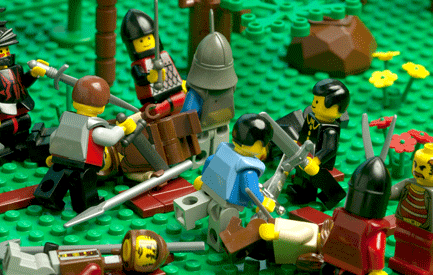
SERGEANT
Yes, as sparrows eagles, or the hare the lion.
If I say sooth, I must report they were
As cannons overcharged with double cracks,
So they doubly redoubled strokes upon the foe.
Except they meant to bathe in reeking wounds
Or memorise another Golgotha,
I cannot tell.

SERGEANT (cont.)
But I am faint. My gashes cry for help.
DUNCAN
So well thy words become thee as thy wounds;
They smack of honour both.—Go get him surgeons.
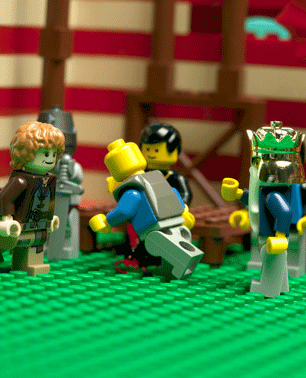
DUNCAN (cont.)
Who comes here?
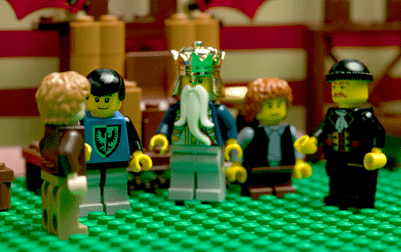
MALCOLM
The worthy Thane of Ross.
LENNOX
What a haste looks through his eyes!
So should he look that seems to speak things strange.
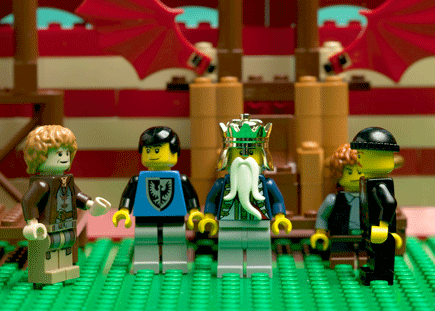
ROSS
God save the king!
DUNCAN
Whence cam’st thou, worthy thane?
ROSS
From Fife, great King,
Where the Norweyan banners flout the sky
And fan our people cold.
Norway himself, with terrible numbers,
Assisted by that most disloyal traitor,
The Thane of Cawdor, began a dismal conflict;
Till that Bellona’s bridegroom, lapped in proof,
Confronted him with self-comparisons,
Point against point, rebellious arm ’gainst arm,
Curbing his lavish spirit; and to conclude,
The victory fell on us.
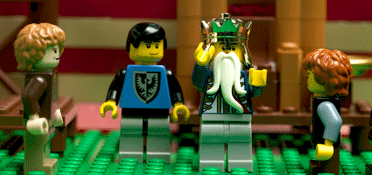
DUNCAN
Great happiness!
ROSS
That now
Sweno, the Norways’ king, craves composition;
Nor would we deign him burial of his men
Till he disbursèd at Saint Colme’s Inch
Ten thousand dollars to our general use.
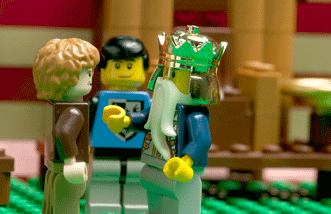
DUNCAN
No more that Thane of Cawdor shall deceive
Our bosom interest. Go pronounce his present death,
And with his former title greet Macbeth.
ROSS
I’ll see it done.
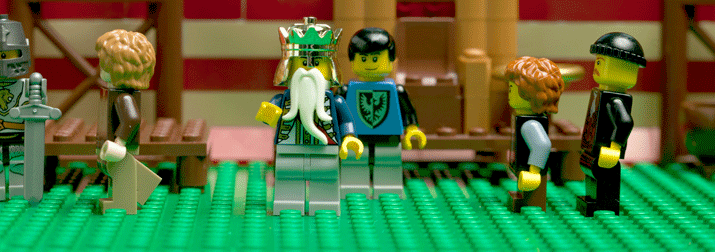
DUNCAN
What he hath lost noble Macbeth hath won.
ACT I. Scene III (30–149).

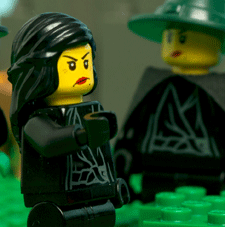
THIRD WITCH
A drum, a drum!
Macbeth doth come.

ALL
The Weird Sisters, hand in hand,
Posters of the sea and land,
Thus do go about, about,
Thrice to thine, and thrice to mine,
And thrice again, to make up nine.
Peace! The charm’s wound up.
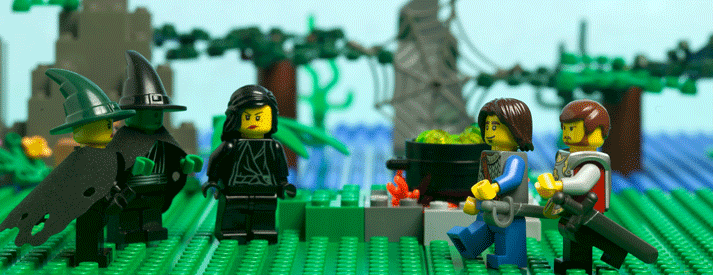
MACBETH
So foul and fair a day I have not seen.
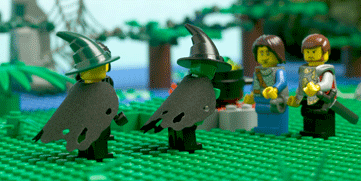
BANQUO
How far is’t called to Forres?—What are these,
So withered and so wild in their attire,
That look not like th’inhabitants o’th’earth
And yet are on’t?—Live you? Or are you aught
That man may question? You seem to understand me
By each at once her choppy finger laying
Upon her skinny lips. You should be women,
And yet your beards forbid me to interpret
That you are so.
MACBETH
Speak, if you can. What are you?
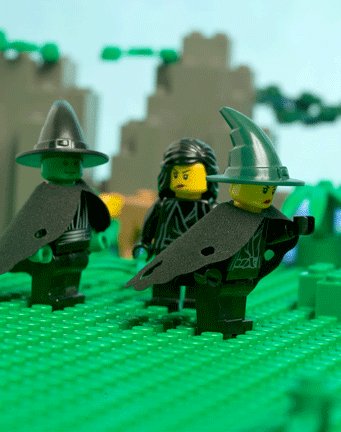
FIRST WITCH
All hail, Macbeth! Hail to thee, Thane of Glamis!
SECOND WITCH
All hail, Macbeth! Hail to thee, Thane of Cawdor!

THIRD WITCH
All hail, Macbeth, thou shalt be king hereafter!
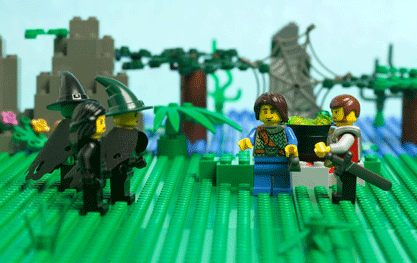
BANQUO
Good sir, why do you start and seem to fear
Things that do sound so fair?—I’th’ name of truth,
Are ye fantastical or that indeed
Which outwardly ye show? My noble partner
You greet with present grace and great prediction
Of noble having and of royal hope,
That he seems rapt withal. To me you speak not.
If you can look into the seeds of time
And say which grain will grow and which will not,
Speak then to me, who neither beg nor fear
Your favours nor your hate.
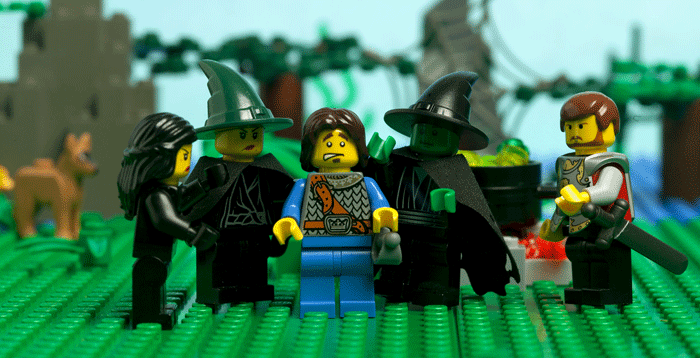
FIRST WITCH
Hail!
SECOND WITCH
Hail!
THIRD WITCH
Hail!
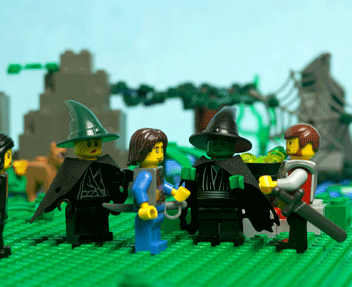
FIRST WITCH
Lesser than Macbeth, and greater.
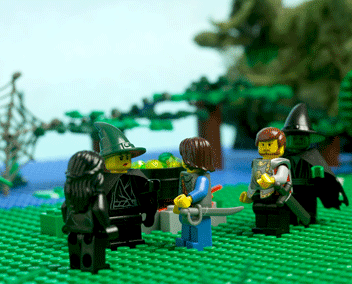
SECOND WITCH
Not so happy, yet much happier.

THIRD WITCH
Thou shalt get kings, though thou be none:
So all hail, Macbeth and Banquo!
FIRST WITCH
Banquo and Macbeth, all hail
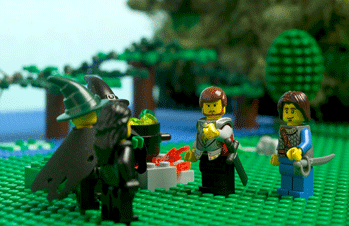
MACBETH
Stay, you imperfect speakers, tell me more!
By Sinel’s death I know I am thane of Glamis,
But how of Cawdor? The Thane of Cawdor lives
A prosperous gentleman; and to be king
Stands not within the prospect of belief,
No more than to be Cawdor. Say from whence
You owe this strange intelligence, or why
Upon this blasted heath you stop our way
With such prophetic greeting? Speak, I charge you.
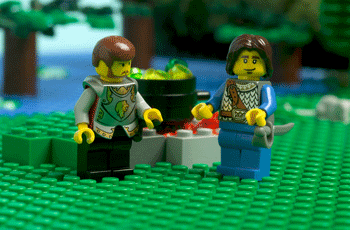
BANQUO
The earth hath bubbles, as the water has,
And these are of them. Whither are they vanished?
MACBETH
Into the air; and what seemed corporal melted,
As breath into the wind. Would they had stayed!
BANQUO
Were such things here as we do speak about?
Or have we eaten on the insane root
That takes the reason prisoner?
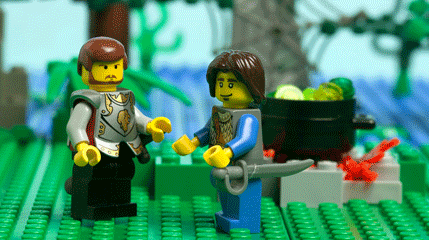
MACBETH
Your children shall be kings.
BANQUO
You shall be king.
MACBETH
And Thane of Cawdor too. Went it not so?
BANQUO
To th’ selfsame tune and words—
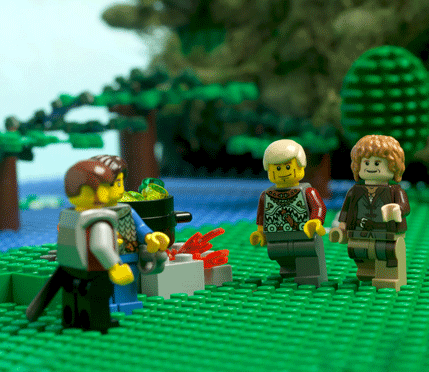
BANQUO (cont.)
Who’s here?
ROSS
The king hath happily received, Macbeth,
The news of thy success; and when he reads
Thy personal venture in the rebels’ fight,
His wonders and his praises do contend
Which should be thine or his. Silenced with that,
In viewing o’er the rest o’th’ selfsame day
He finds thee in the stout Norweyan ranks,
Nothing afeard of what thyself didst make,
Strange images of death. As thick as tale
Came post with post; and every one did bear
Thy praises in his kingdom’s great defence,
And poured them down before him.
ANGUS
We are sent
To give thee from our royal master thanks,
Only to herald thee into his sight,
Not pay thee.
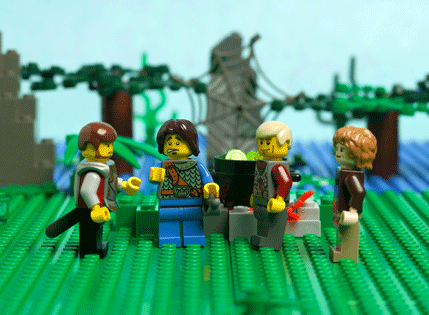
ROSS
And, for an earnest of a greater honour,
He bade me, from him, call thee Thane of Cawdor;
In which addition, hail, most worthy thane,
For it is thine.
BANQUO
What, can the devil speak true?
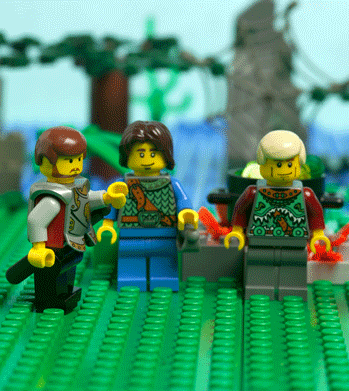
MACBETH
The Thane of Cawdor lives. Why do you dress me
In borrowed robes?
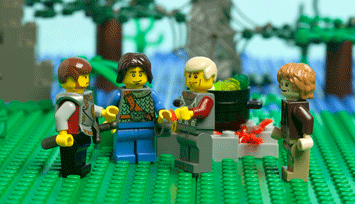
ANGUS
Who was the thane lives yet,
But under heavy judgment bears that life
Which he deserves to lose. Whether he was combined
With those of Norway, or did line the rebel
With hidden help and vantage, or that with both
He laboured in his country’s wrack, I know not;
But treasons capital, confessed and proved,
Have overthrown him.
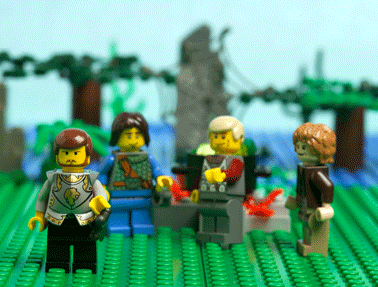
MACBETH
Glamis, and Thane of Cawdor!
The greatest is behind.

MACBETH (cont.)
Thanks for your pains.

MACBETH (cont.)
Do you not hope your children shall be kings,
When those that gave the Thane of Cawdor to me
Promised no less to them?
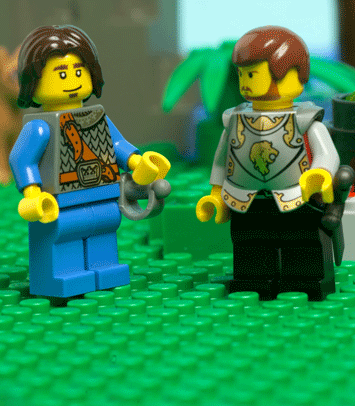
BANQUO
That trusted home
Might yet enkindle you unto the crown,
Besides the Thane of Cawdor. But ’tis strange;
And oftentimes to win us to our harm
The instruments of darkness tell us truths,
Win us with honest trifles, to betray ’s
In deepest consequence.—
Cousins, a word, I pray you.
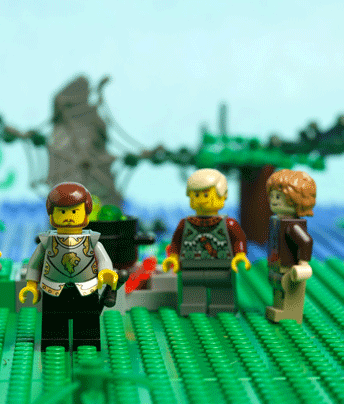
MACBETH
Two truths are told,
As happy prologues to the swelling act
Of the imperial theme.—I thank you, gentlemen.
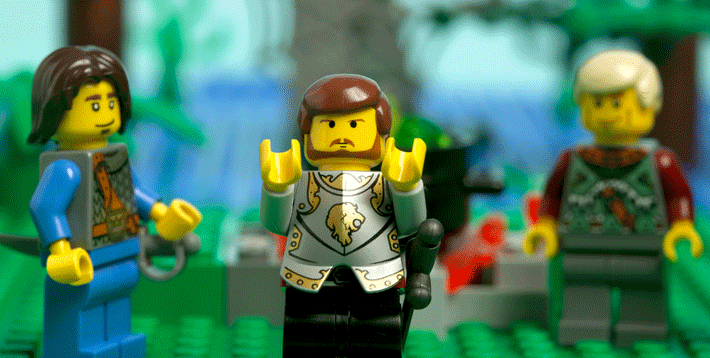
MACBETH (cont.)
This supernatural soliciting
Cannot be ill, cannot be good. If ill,
Why hath it given me earnest of success
Commencing in a truth? I am Thane of Cawdor.
If good, why do I yield to that suggestion
Whose horrid image doth unfix my hair
And make my seated heart knock at my ribs,
Against the use of nature? Present fears
Are less than horrible imaginings.
My thought, whose murder yet is but fantastical,
Shakes so my single state of man
That function is smothered in surmise,
And nothing is but what is not.
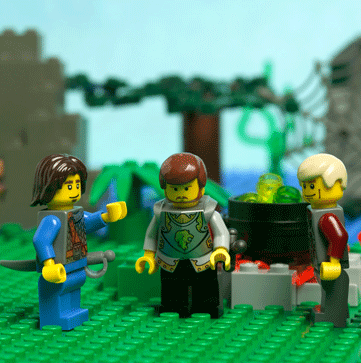
BANQUO
Look how our partner’s rapt.
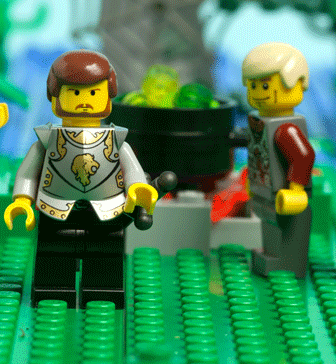
MACBETH
If chance will have me king, why, chance may crown me,
Without my stir.
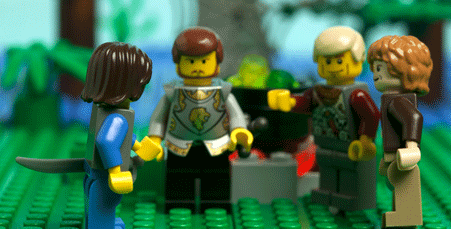
BANQUO
New honors come upon him,
Like our strange garments, cleave not to their mould
But with the aid of use.
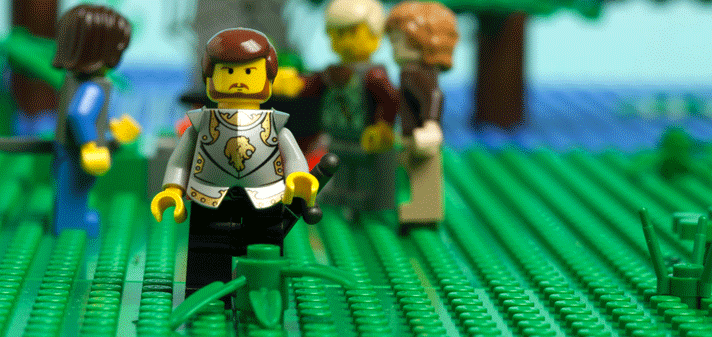
MACBETH
Come what come may,
Time and the hour runs through the roughest day.
ACT I. Scene V (1–73).

Shortly after the witches foretell Macbeth and Banquo’s royal prophecies, the pair meets up with King Duncan, who praises their loyalty and bravery. The traitorous Thane of Cawdor has been executed, and as promised by the witches, Macbeth will take his place. King Duncan jovially tells the men that his son, Malcolm, will be Prince of Cumberland, and therefore next in line to the throne. As King Duncan makes short-notice plans to visit Macbeth’s castle at Inverness in celebration, Macbeth is struck by this new obstruction—Malcolm—in his seemingly straight line to the crown. In response to this unforeseen difficulty, Macbeth whispers to himself, “Stars, hide your fires;/Let not light see my black and deep desires./The eye wink at the hand; yet let that be/Which the eye fears, when it is done, to see” (I.iv.50–53). The first of many dark thoughts stir in Macbeth’s head as he realizes that he must wear the mask of devotion to the King, tricking even himself, while secretly plotting to usurp the throne at any cost. With this dark seed sprouting, Macbeth goes ahead of the group to notify Lady Macbeth and his servants that King Duncan will be coming to his castle at Inverness shortly.
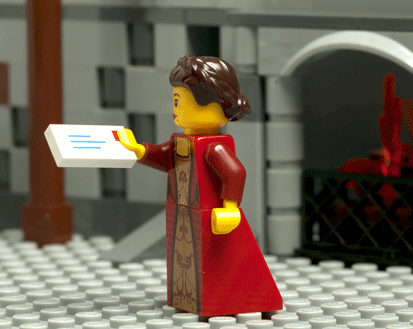
LADY MACBETH
“They met me in the day of success:
and I have learned by the perfect’st report
they have more in them than mortal knowledge. When I
burnt in desire to question them further, they made
themselves air, into which they vanished. Whiles I
stood rapt in the wonder of it came missives from the
King, who all-hailed me ‘Thane of Cawdor,’ by which
title, before, these Weird Sisters saluted me, and re-
ferred me to the coming on of time with ‘Hail, king
that shalt be!’ This have I thought good to deliver thee,
my dearest partner of greatness, that thou mightst not
lose the dues of rejoicing by being ignorant of
what greatness is promised thee. Lay it to thy heart, and
farewell.”
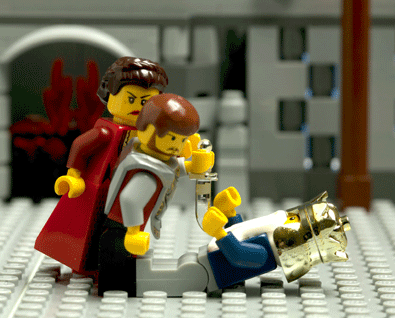
LADY MACBETH (cont.)
Glamis thou art, and Cawdor; and shalt be
What thou art promised. Yet do I fear thy nature;
It is too full o’th’ milk of human kindness
To catch the nearest way. Thou wouldst be great,
Art not without ambition, but without
The illness should attend it. What thou wouldst highly,
That wouldst thou holily; wouldst not play false,
And yet wouldst wrongly win. Thou’dst have, great Glamis,
That which cries “Thus thou must do,” if thou have it;
And that which rather thou dost fear to do
Than wishest should be undone. Hie thee hither,
That I may pour my spirits in thine ear
And chastise with the valour of my tongue
All that impedes thee from the golden round
Which fate and metaphysical aid doth seem
To have thee crowned withal.
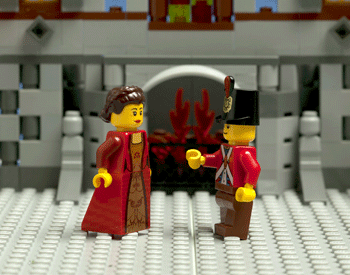
LADY MACBETH (cont.)
What is your tidings?
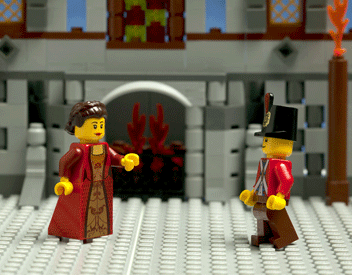
Messenger
The King comes here tonight.
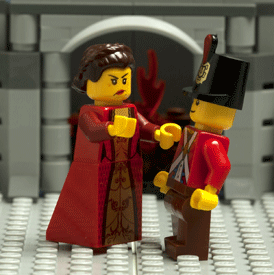
LADY MACBETH
Thou’rt mad to say it!
Is not thy master with him, who, were’t so,
Would have informed for preparation?

MESSENGER
So please you, it is true. Our thane is coming.
One of my fellows had the speed of him,
Who, almost dead for breath, had scarcely more
Than would make up his message.
LADY MACBETH
Give him tending;
He brings great news.
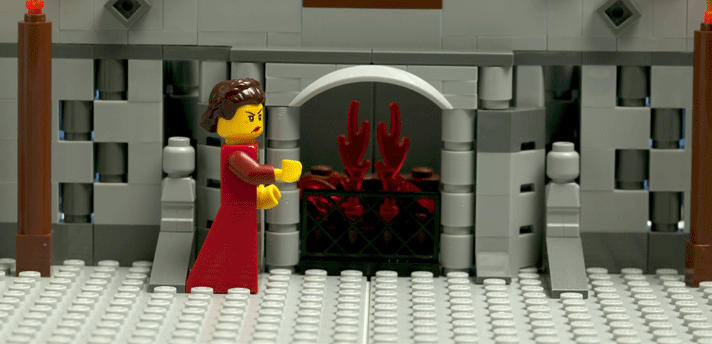
LADY MACBETH (cont.)
The raven himself is hoarse
That croaks the fatal entrance of Duncan
Under my battlements. Come, you spirits
That tend on mortal thoughts, unsex me here
And fill me from the crown to the toe top-full
Of direst cruelty! Make thick my blood;
Stop up th’access and passage to remorse,
That no compunctious visitings of nature
Shake my fell purpose, nor keep peace between
The effect and it! Come to my woman’s breasts
And take my milk for gall, you murd’ring ministers,
Wherever in your sightless substances
You wait on nature’s mischief! Come, thick night,
And pall thee in the dunnest smoke of hell,
That my keen knife see not the wound it makes,
Nor heaven peep through the blanket of the dark
To cry “Hold, hold!”

LADY MACBETH (cont.)
Great Glamis! Worthy Cawdor!
Greater than both by the all-hail hereafter!
Thy letters have transported me beyond
This ignorant present, and I feel now
The future in the instant.
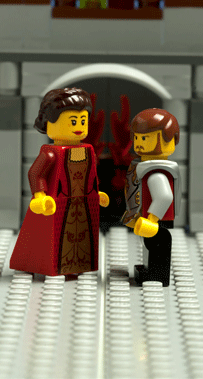
MACBETH
My dearest love,
Duncan comes here tonight.

LADY MACBETH
And when goes hence?
MACBETH
Tomorrow, as he purposes.
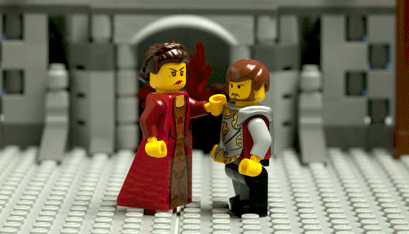
LADY MACBETH
O, never
Shall sun that morrow see!
Your face, my thane, is as a book where men
May read strange matters. To beguile the time,
Look like the time; bear welcome in your eye,
Your hand, your tongue. Look like the innocent flower,
But be the serpent under’t. He that’s coming
Must be provided for; and you shall put
This night’s great business into my dispatch;
Which shall to all our nights and days to come
Give solely sovereign sway and masterdom.
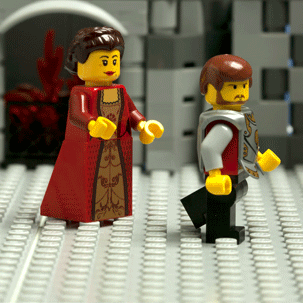
MACBETH
We will speak further.

LADY MACBETH
Only look up clear.
To alter favour ever is to fear:
Leave all the rest to me.
ACT I. Scene VII (1–83).

King Duncan and his entourage arrive at Macbeth’s castle, and all are greeted by a saccharine Lady Macbeth. Duncan buoyantly praises Lady Macbeth for receiving them on such short notice, and Lady Macbeth responds in kind, despite the wheels of treachery that are already turning in her head. They all prepare for a celebration as the hosts of the party begin to plot the demise of the throne.
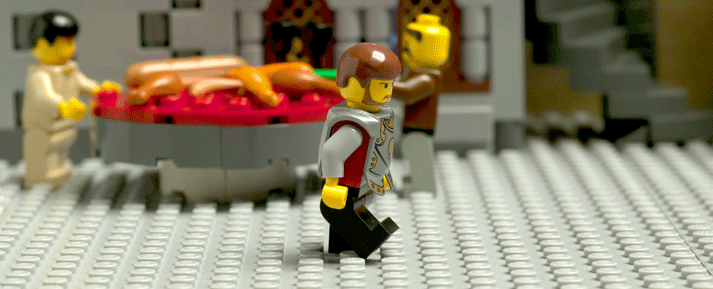
MACBETH
If it were done when ’tis done, then ’twere well
It were done quickly. If th’assassination
Could trammel up the consequence, and catch
With his surcease success—that but this blow
Might be the be-all and the end-all!—here,
But here, upon this bank and shoal of time,
We’d jump the life to come. But in these cases
We still have judgment here, that we but teach
Bloody instructions, which, being taught, return
To plague th’inventor. This evenhanded justice
Commends th’ingredients of our poisoned chalice
To our own lips. He’s here in double trust:
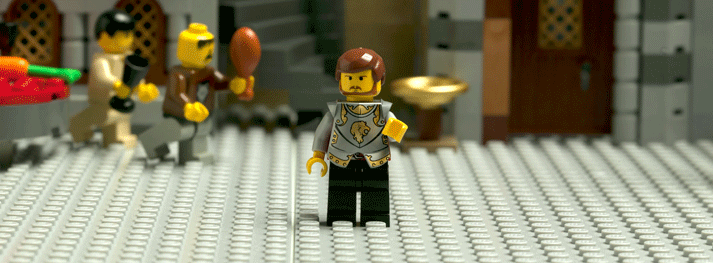
MACBETH (cont.)
First, as I am his kinsman and his subject,
Strong both against the deed; then, as his host,
Who should against his murderer shut the door,
Not bear the knife myself. Besides, this Duncan
Hath borne his faculties so meek, hath been
So clear in his great office, that his virtues
Will plead like angels, trumpet-tongued, against
The deep damnation of his taking-off;
And Pity, like a naked newborn babe
Striding the blast, or heaven’s cherubin, horsed
Upon the sightless couriers of the air,
Shall blow the horrid deed in every eye,
That tears shall drown the wind. I have no spur
To prick the sides of my intent, but only
Vaulting ambition, which o’erleaps itself
And falls on th’other.
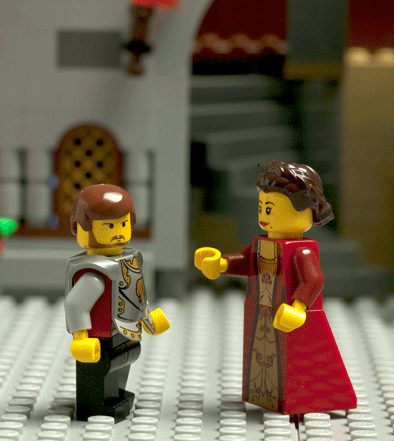
MACBETH (cont.)
How now, what news?
LADY MACBETH
He has almost supped.
Why have you left the chamber?

MACBETH
Hath he asked for me?
LADY MACBETH
Know you not he has?
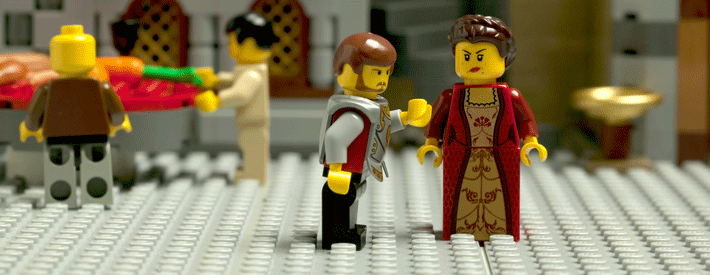
MACBETH
We will proceed no further in this business.
He hath honoured me of late, and I have bought
Golden opinions from all sorts of people,
Which would be worn now in their newest gloss,
Not cast aside so soon.
LADY MACBETH
Was the hope drunk
Wherein you dressed yourself? Hath it slept since?
And wakes it now, to look so green and pale
At what it did so freely? From this time
Such I account thy love. Art thou afeard
To be the same in thine own act and valour
As thou art in desire? Wouldst thou have that
Which thou esteem’st the ornament of life,
And live a coward in thine own esteem,
Letting “I dare not” wait upon “I would,”
Like the poor cat i’th’ adage?

MACBETH
Prithee, peace:
I dare do all that may become a man;
Who dares do more is none.
LADY MACBETH
What beast was’t, then,
That made you break this enterprise to me?
When you durst do it, then you were a man;
And, to be more than what you were, you would
Be so much more the man. Nor time nor place
Did then adhere, and yet you would make both.
They have made themselves, and that their fitness now
Does unmake you. I have given suck, and know
How tender ’tis to love the babe that milks me;
I would, while it was smiling in my face,
Have plucked my nipple from his boneless gums
And dashed the brains out, had I so sworn as you
Have done to this.
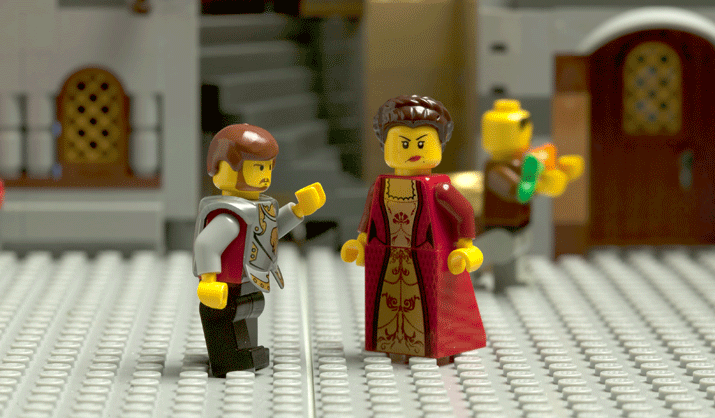
MACBETH
If we should fail?
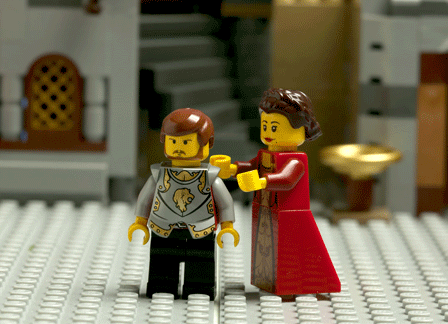
LADY MACBETH
We fail?
But screw your courage to the sticking place
And we’ll not fail. When Duncan is asleep—
Whereto the rather shall his day’s hard journey
Soundly invite him—his two chamberlains
Will I with wine and wassail so convince
That memory, the warder of the brain,
Shall be a fume, and the receipt of reason
A limbeck only. When in swinish sleep
Their drenchèd natures lies as in a death,
What cannot you and I perform upon
Th’unguarded Duncan? What not put upon
His spongy officers, who shall bear the guilt
Of our great quell?
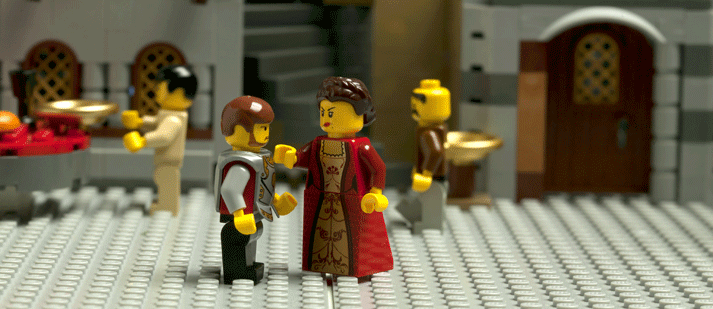
MACBETH
Bring forth men-children only!
For thy undaunted mettle should compose
Nothing but males. Will it not be received,
When we have marked with blood those sleepy two
Of his own chamber and used their very daggers,
That they have done’t?
LADY MACBETH
Who dares receive it other,
As we shall make our griefs and clamour roar
Upon his death?
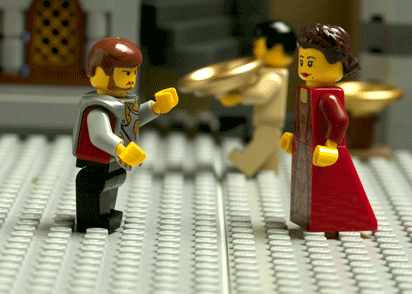
MACBETH
I am settled, and bend up
Each corporal agent to this terrible feat.
Away, and mock the time with fairest show.
False face must hide what the false heart doth know.
ACT II. Scene I (34–65).

Late that evening, Banquo and his son Fleance are walking the halls of Macbeth’s castle and bump into the toiling Macbeth. Banquo describes how happy King Duncan was throughout the evening, having given out many gifts to Macbeth’s household for their hospitality. Banquo gives Macbeth a large diamond, which is a gift from the King to Lady Macbeth for being such a welcoming hostess. Banquo then mentions a dream he had about the three witches’ prophecies and tries to discuss it with Macbeth, who waves him off and tells him they can talk another time. Banquo and his son head to bed, and Macbeth continues to wander the corridors, still preoccupied with his plans for murder.
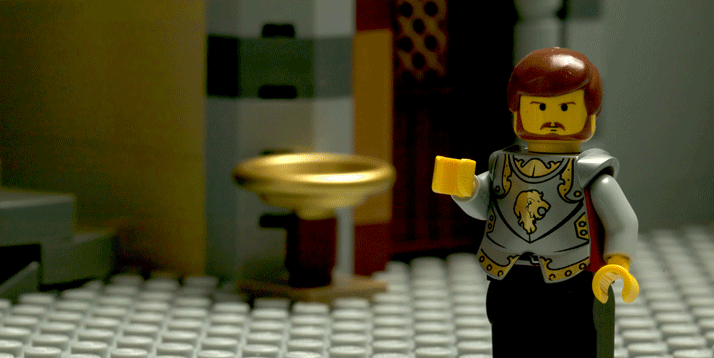
MACBETH
Is this a dagger which I see before me,
The handle toward my hand? Come, let me clutch thee.
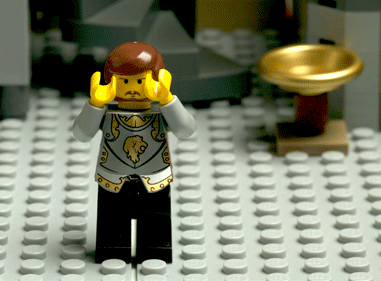
MACBETH (cont.)
I have thee not, and yet I see thee still.
Art thou not, fatal vision, sensible
To feeling as to sight? Or art thou but
A dagger of the mind, a false creation,
Proceeding from the heat-oppressèd brain?
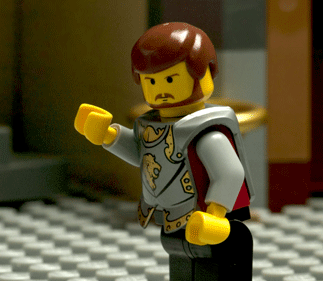
MACBETH (cont.)
I see thee yet, in form as palpable
As this which now I draw.
Thou marshall’st me the way that I was going,
And such an instrument I was to use.
Mine eyes are made the fools o’th’other senses,
Or else worth all the rest. I see thee still,
And on thy blade and dudgeon gouts of blood,
Which was not so before. There’s no such thing.
It is the bloody business which informs
Thus to mine eyes. Now o’er the one half world
Nature seems dead, and wicked dreams abuse
The curtained sleep.

MACBETH (cont.)
Witchcraft celebrates
Pale Hecate’s offerings, and withered Murder,
Alarumed by his sentinel, the wolf,
Whose howl’s his watch, thus with his stealthy pace,
With Tarquin’s ravishing strides, towards his design
Moves like a ghost. Thou sure and firm-set earth,

MACBETH (cont.)
Hear not my steps which way they walk, for fear
Thy very stones prate of my whereabout
And take the present horror from the time
Which now suits with it. Whiles I threat, he lives;
Words to the heat of deeds too cold breath gives.
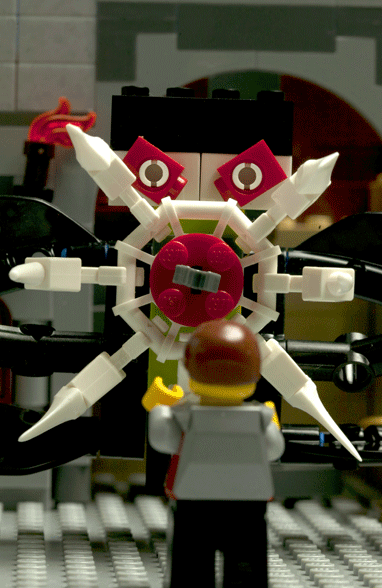
MACBETH (cont.)
I go, and it is done. The bell invites me.
Hear it not, Duncan, for it is a knell
That summons thee to heaven or to hell.
ACT II. Scene II (1–78).

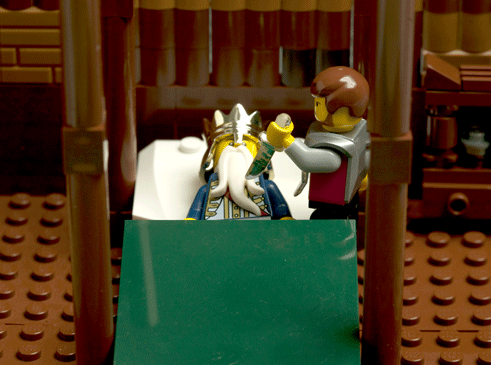
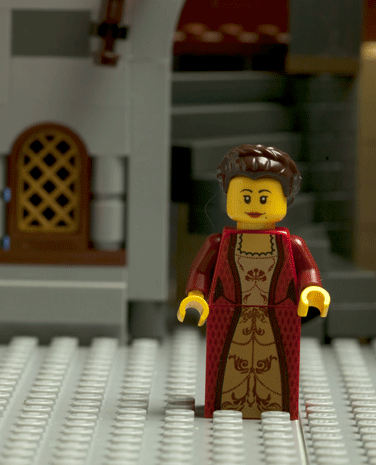
LADY MACBETH
That which hath made them drunk hath made me bold;
What hath quenched them hath given me fire.

LADY MACBETH (cont.)
Hark! Peace!
It was the owl that shrieked, the fatal bellman,
Which gives the stern’st good-night. He is about it.
The doors are open; and the surfeited grooms
Do mock their charge with snores: I have drugged their possets,
That death and nature do contend about them,
Whether they live or die.

MACBETH
[Within] Who’s there? What, ho!
LADY MACBETH
Alack, I am afraid they have awaked,
And ’tis not done. Th’attempt and not the deed
Confounds us. Hark! I laid their daggers ready;
He could not miss ’em. Had he not resembled
My father as he slept, I had done’t.
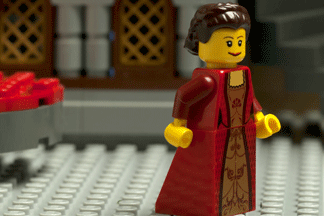
LADY MACBETH (cont.)
My husband!
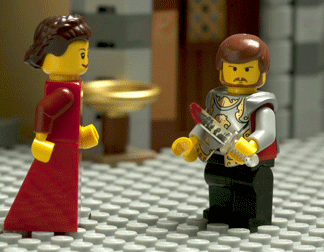
MACBETH
I have done the deed. Didst thou not hear a noise?

LADY MACBETH
I heard the owl scream and the crickets cry.
Did not you speak?
MACBETH
When?
LADY MACBETH
Now.
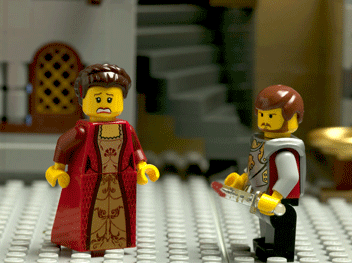
MACBETH
As I descended?
LADY MACBETH
Ay.
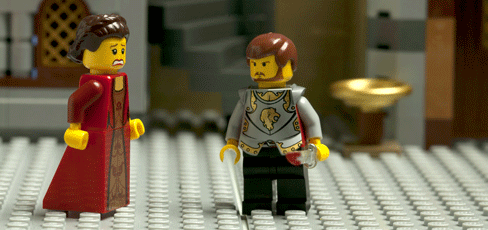
MACBETH
Hark!
Who lies i’th’ second chamber?
LADY MACBETH
Donalbain.
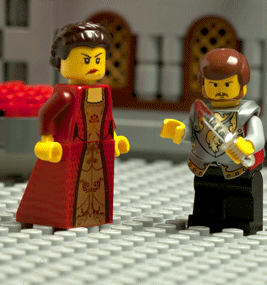
MACBETH
This is a sorry sight.
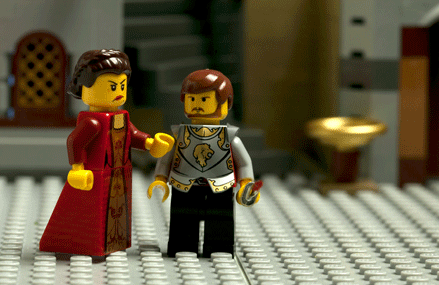
LADY MACBETH
A foolish thought, to say a sorry sight.
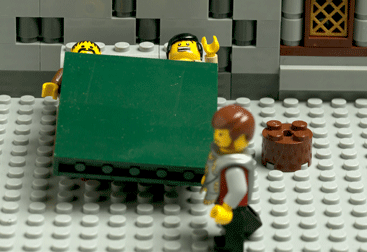
MACBETH
There’s one did laugh in ’s sleep, and one cried “Murder!”
That they did wake each other: I stood and heard them.
But they did say their prayers, and addressed them
Again to sleep.
LADY MACBETH
There are two lodged together.

MACBETH
One cried “God bless us!” and “Amen” the other,
As they had seen me with these hangman’s hands.
List’ning their fear, I could not say “Amen,”
When they did say “God bless us!”
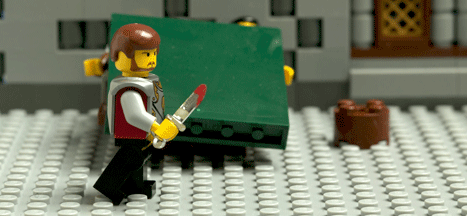
LADY MACBETH
Consider it not so deeply.
MACBETH
But wherefore could not I pronounce “Amen”?
I had most need of blessing, and “Amen”
Stuck in my throat.
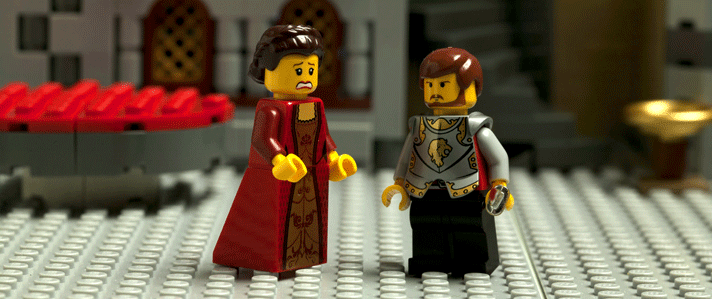
LADY MACBETH
These deeds must not be thought
After these ways; so, it will make us mad.
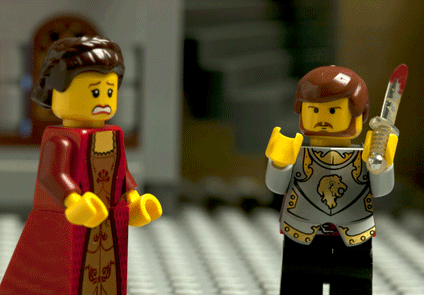
MACBETH
Methought I heard a voice cry “Sleep no more!
Macbeth does murder sleep,” the innocent sleep,
Sleep that knits up the raveled sleeve of care,
The death of each day’s life, sore labour’s bath,
Balm of hurt minds, great nature’s second course,
Chief nourisher in life’s feast—
LADY MACBETH
What do you mean?
MACBETH
Still it cried “Sleep no more!” to all the house;
“Glamis hath murdered sleep, and therefore Cawdor
Shall sleep no more; Macbeth shall sleep no more.”
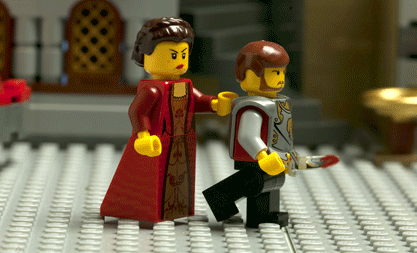
LADY MACBETH
Who was it that thus cried? Why, worthy thane,
You do unbend your noble strength, to think
So brainsickly of things. Go get some water
And wash this filthy witness from your hand.
Why did you bring these daggers from the place?
They must lie there. Go carry them and smear
The sleepy grooms with blood.
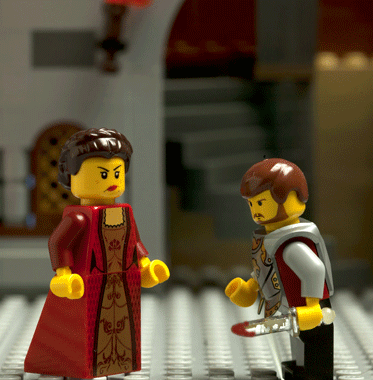
MACBETH
I’ll go no more:
I am afraid to think what I have done;
Look on’t again I dare not.
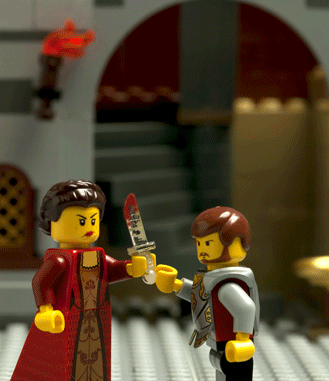
LADY MACBETH
Infirm of purpose!
Give me the daggers: the sleeping and the dead
Are but as pictures. ’Tis the eye of childhood
That fears a painted devil. If he do bleed,
I’ll gild the faces of the grooms withal,
For it must seem their guilt.
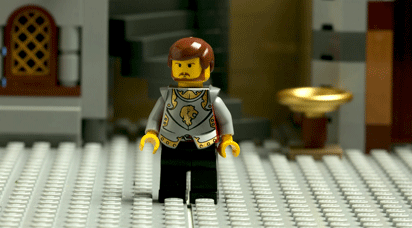
MACBETH
Whence is that knocking?
How is’t with me, when every noise appalls me?
What hands are here? Ha! They pluck out mine eyes.
Will all great Neptune’s ocean wash this blood
Clean from my hand? No, this my hand will rather
The multitudinous seas in incarnadine,
Making the green one red.
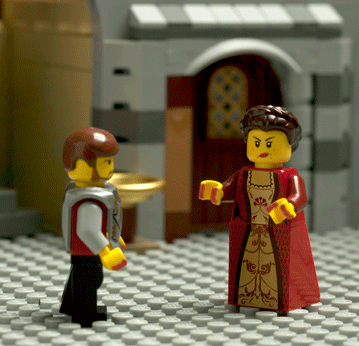
LADY MACBETH
My hands are of your colour; but I shame
To wear a heart so white.
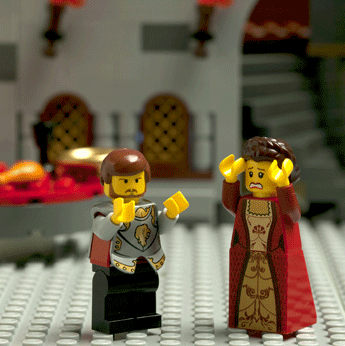
LADY MACBETH (cont.)
I hear a knocking
At the south entry. Retire we to our chamber;
A little water clears us of this deed.
How easy is it, then! Your constancy
Hath left you unattended.
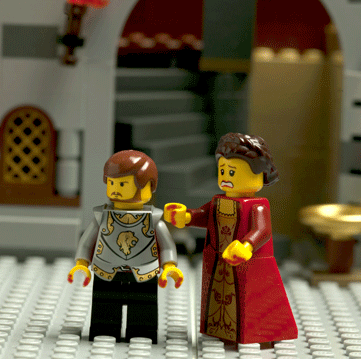
LADY MACBETH (cont.)
Hark! More knocking.
Get on your nightgown, lest occasion call us
And show us to be watchers. Be not lost
So poorly in your thoughts.
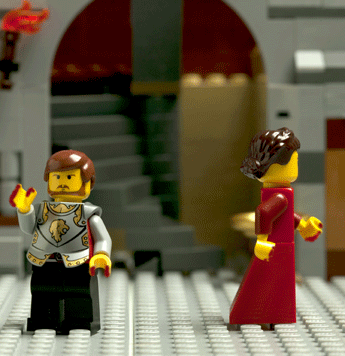
MACBETH
To know my deed, ’twere best not know myself.
Wake Duncan with thy knocking! I would thou couldst!
ACT II. Scene III (41–148).

It is the early morning and the knocking that startled Macbeth and Lady Macbeth amidst their violent crime continues. The castle’s porter attends to the knocking, though not without a drunken monologue likening himself to the gatekeeper of Hell. His slurred speech is not so far from the truth, though no one knows what has occurred in the castle just yet. The porter lets in Macduff and Lennox, who are there to wake King Duncan for the day ahead. Macbeth joins the chatting group, feigning that he was awoken by the loud knocking,which will be his first of many lies about the coming discovery of King Duncan’s death.

MACDUFF
Is thy master stirring?
Our knocking has awaked him. Here he comes.
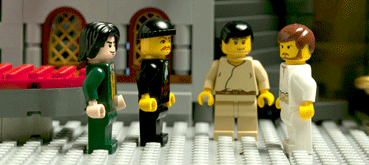
LENNOX
Good morrow, noble sir.
MACBETH
Good morrow, both.
MACDUFF
Is the King stirring, worthy thane?
MACBETH
Not yet.
MACDUFF
He did command me to call timely on him.
I have almost slipped the hour.
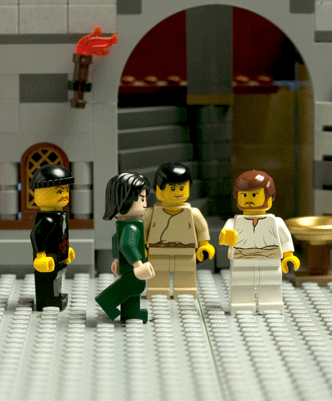
MACBETH
I’ll bring you to him.
MACDUFF
I know this is a joyful trouble to you,
But yet ’tis one.

MACBETH
The labour we delight in physics pain.
This is the door.
MACDUFF
I’ll make so bold to call,
For ’tis my limited service.

LENNOX
Goes the King hence today?
MACBETH
He does; he did appoint so.
LENNOX
The night has been unruly. Where we lay,
Our chimneys were blown down, and, as they say,
Lamentings heard i’th’air, strange screams of death,
And prophesying with accents terrible
Of dire combustion and confused events
New hatched to the woeful time. The obscure bird
Clamoured the livelong night. Some say the earth
Was feverous and did shake.
MACBETH
’Twas a rough night.
LENNOX
My young remembrance cannot parallel
A fellow to it.
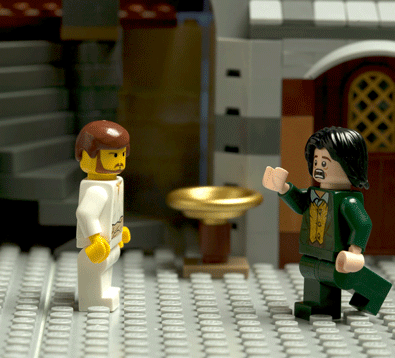
MACDUFF
O horror, horror, horror!
Tongue nor heart cannot conceive nor name thee!
MACBETH and LENNOX
What’s the matter?
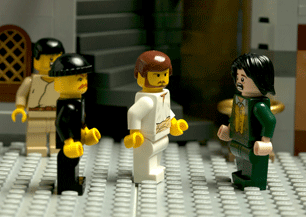
MACDUFF
Confusion now hath made his masterpiece!
Most sacrilegious murder hath broke ope
The Lord’s anointed temple, and stole thence
The life o’th’ building!

MACBETH
What is’t you say? The life?
LENNOX
Mean you His Majesty?
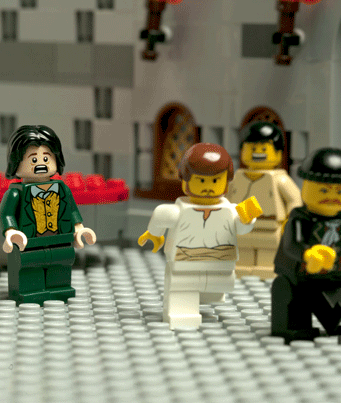
MACDUFF
Approach the chamber and destroy your sight
With a new Gorgon. Do not bid me speak;
See, and then speak yourselves.
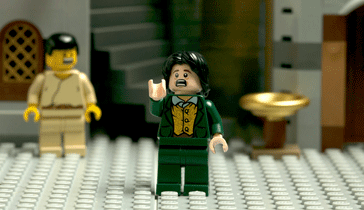
MACDUFF (cont.)
Awake, awake!
Ring the alarum bell. Murder and treason!
Banquo and Donalbain, Malcolm, awake!
Shake off this downy sleep, death’s counterfeit,
And look on death itself! Up, up, and see
The great doom’s image! Malcolm, Banquo,
As from your graves rise up and walk like sprites
To countenance this horror! Ring the bell.
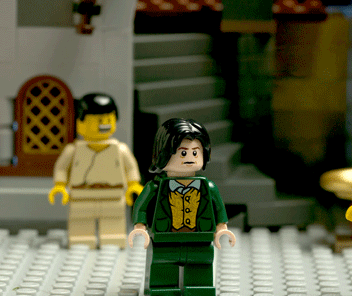
LADY MACBETH
What’s the business,
That such a hideous trumpet calls to parley
The sleepers of the house? Speak, speak!

MACDUFF
O, gentle lady,
’Tis not for you to hear what I can speak.
The repetition in a woman’s ear
Would murder as it fell.
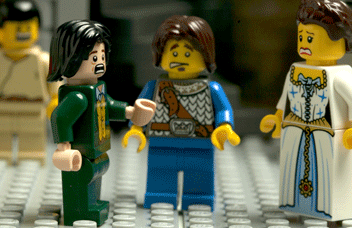
MACDUFF (cont.)
O Banquo, Banquo,
Our royal master’s murdered!
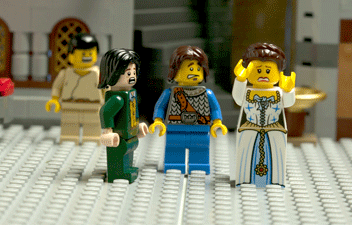
LADY MACBETH
Woe, alas!
What, in our house?
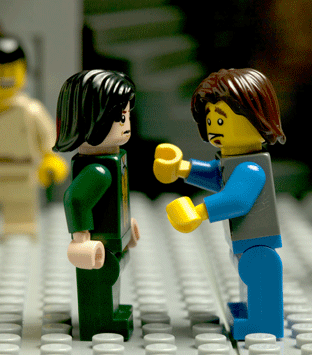
BANQUO
Too cruel anywhere.
Dear Duff, I prithee, contradict thyself
And say it is not so.
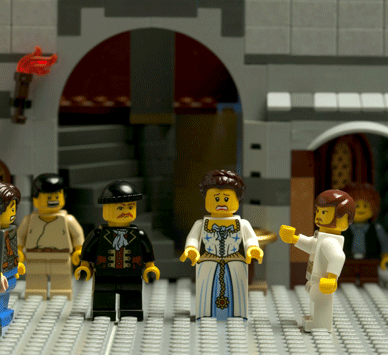
MACBETH
Had I but died an hour before this chance
I had lived a blessèd time; for from this instant
There’s nothing serious in mortality.
All is but toys: renown and grace is dead;
The wine of life is drawn, and the mere lees
Is left this vault to brag of.

DONALBAIN
What is amiss?

MACBETH
You are, and do not know’t.
The spring, the head, the fountain of your blood
Is stopped, the very source of it is stopped.
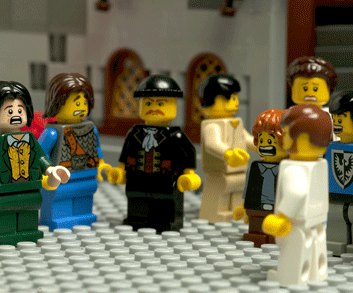
MACDUFF
Your royal father’s murdered.
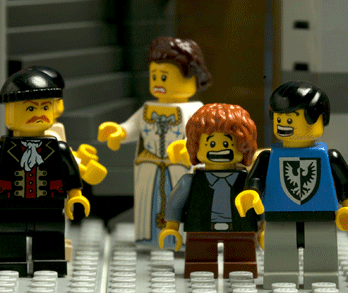
MALCOLM
O, by whom?
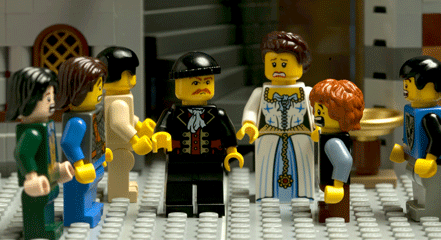
LENNOX
Those of his chamber, as it seemed, had done’t.
Their hands and faces were all badged with blood;
So were their daggers, which unwiped we found
Upon their pillows. They stared, and were distracted;
No man’s life was to be trusted with them.
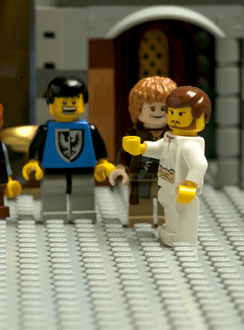
MACBETH
O, yet I do repent me of my fury,
That I did kill them.
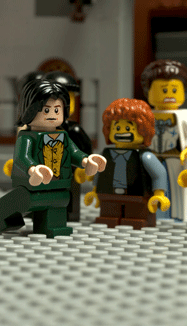
MACDUFF
Wherefore did you so?
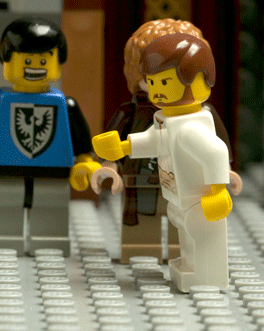
MACBETH
Who can be wise, amazed, temp’rate and furious,
Loyal and neutral, in a moment? No man.
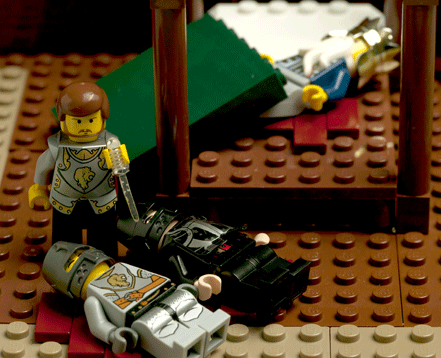
MACBETH (cont.)
Th’expedition my violent love
Outrun the pauser, reason. Here lay Duncan,
His silver skin laced with his golden blood,
And his gashed stabs looked like a breach in nature
For ruin’s wasteful entrance; there, the murderers,
Steeped in the colours of their trade, their daggers
Unmannerly breeched with gore. Who could refrain
That had a heart to love, and in that heart
Courage to make ’s love known?
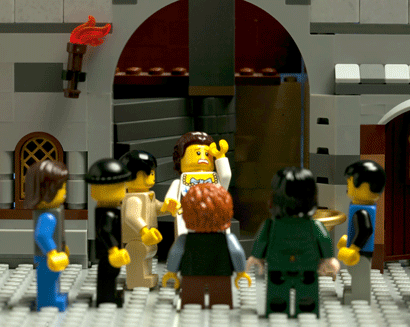
LADY MACBETH
Help me hence, ho!
MACDUFF
Look to the lady.
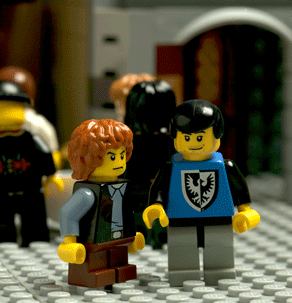
MALCOLM
Why do we hold our tongues,
That most may claim this argument for ours?

DONALBAIN
What should be spoken here, where our fate,
Hid in an auger-hole, may rush and seize us?
Let’s away. Our tears are not yet brewed.
MALCOLM
Nor our strong sorrow upon the foot of motion.
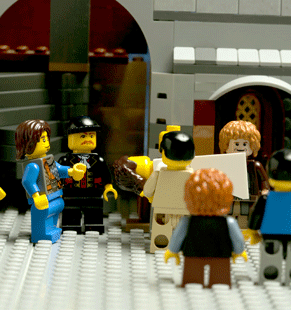
BANQUO
Look to the lady:
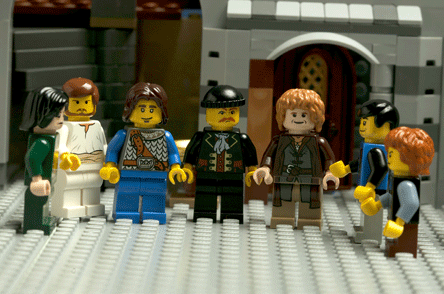
BANQUO (cont.)
And when we have our naked frailties hid,
That suffer in exposure, let us meet
And question this most bloody piece of work
To know it further. Fears and scruples shake us.
In the great hand of God I stand, and thence
Against the undivulged pretence I fight
Of treasonous malice.
MACDUFF
And so do I.
ALL
So all.
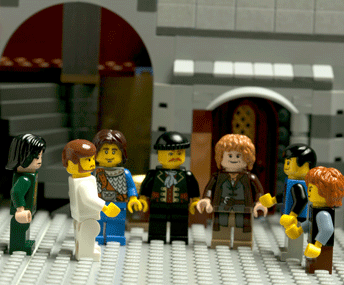
MACBETH
Let’s briefly put on manly readiness,
And meet i’th’ hall together.
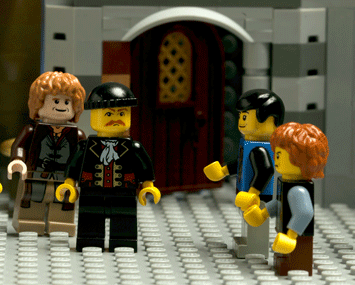
ALL
Well contented.
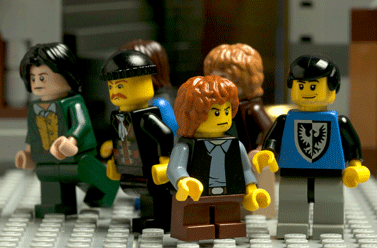
MALCOLM
What will you do? Let’s not consort with them.
To show an unfelt sorrow is an office
Which the false man does easy. I’ll to England.
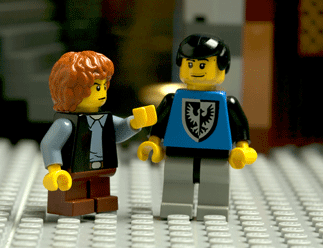
DONALBAIN
To Ireland, I; our separated fortune
Shall keep us both the safer. Where we are,
There’s daggers in men’s smiles; the nea’er in blood,
The nearer bloody.
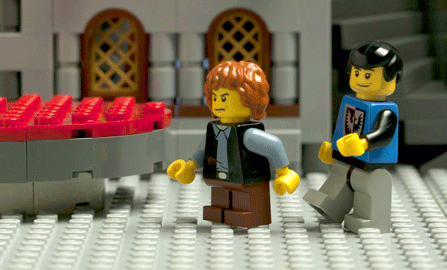
MALCOLM
This murderous shaft that’s shot
Hath not yet lighted, and our safest way
Is to avoid the aim. Therefore to horse,
And let us not be dainty of leave-taking,
But shift away. There’s warrant in that theft
Which steals itself when there’s no mercy left.
ACT III. Scene I (1–143).

In the early wake of King Duncan’s violent murder, an old man, Ross, and Macduff discuss the horror of the crime and what it means for Scotland. Macbeth has led them to believe that the guards in King Duncan’s chamber were responsible for his death, and that he killed them in a seemingly loyal fit of rage for having supposedly murdered his beloved King. He has also planted the idea that King Duncan’s sons, Malcolm and Donalbain, paid the two guards to kill their father, and that their subsequent flight is indicative of their guilt. In this discussion, it is revealed that Macbeth will go to Scone to be crowned as King, while the body of King Duncan will goto Colmekill to be buried in his family tomb. The witches’ initial prophecy is now fulfilled.

BANQUO
Thou hast it now—King, Cawdor, Glamis, all
As the weird women promised, and I fear
Thou played’st most foully for’t. Yet it was said
It should not stand in thy posterity,
But that myself should be the root and father
Of many kings. If there come truth from them—
As upon thee, Macbeth, their speeches shine—
Why, by the verities on thee made good,
May they not be my oracles as well
And set me up in hope? But hush, no more.
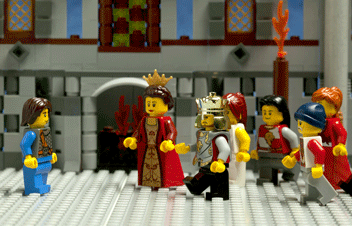
MACBETH
Here’s our chief guest.
LADY MACBETH
If he had been forgotten,
It had been as a gap in our great feast
And all-thing unbecoming.
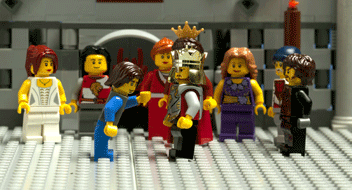
MACBETH
Tonight we hold a solemn supper, sir,
And I’ll request your presence.
BANQUO
Let Your Highness
Command upon me, to the which my duties
Are with a most indissoluble tie
Forever knit.
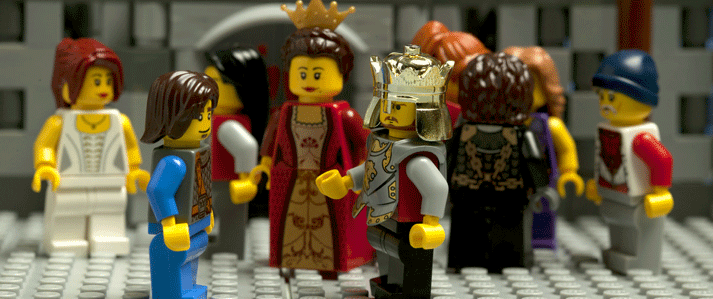
MACBETH
Ride you this afternoon?
BANQUO
Ay, my good lord.

MACBETH
We should have else desired your good advice,
Which still hath been both grave and prosperous,
In this day’s council; but we’ll take tomorrow.
Is’t far you ride?
BANQUO
As far, my lord, as will fill up the time
Twixt this and supper. Go not my horse the better,
I must become a borrower of the night
For a dark hour or twain.
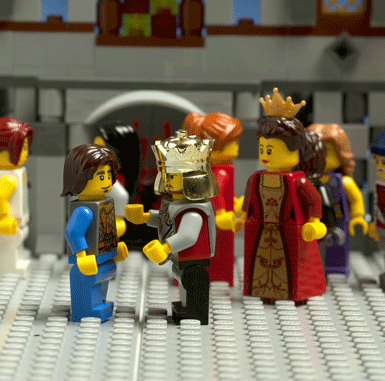
MACBETH
Fail not our feast.
BANQUO
My lord, I will not.
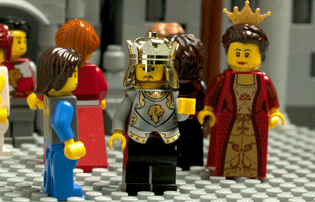
MACBETH
We hear our bloody cousins are bestowed
In England and in Ireland, not confessing
Their cruel parricide, filling their hearers
With strange invention. But of that tomorrow,
When therewithal we shall have cause of state
Craving us jointly. Hie you to horse. Adieu,
Till you return at night. Goes Fleance with you?

BANQUO
Ay, my good lord: our time does call upon ’s.
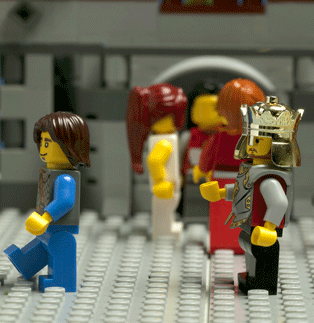
MACBETH
I wish your horses swift and sure of foot,
And so I do commend you to their backs.
Farewell.
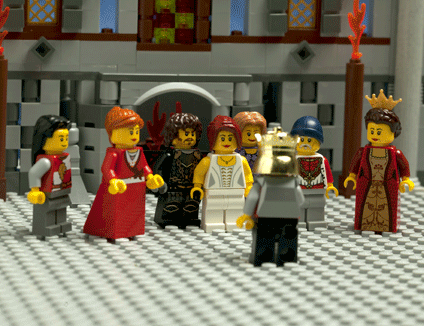
MACBETH (cont.)
Let every man be master of his time
Till seven at night. To make society
The sweeter welcome, we will keep ourself
Till supper-time alone. While then, God be with you!

MACBETH (cont.)
Sirrah, a word with you. Attend those men
Our pleasure?
ATTENDANT
They are, my lord, without the palace gate.
MACBETH
Bring them before us.

MACBETH (cont.)
To be thus is nothing;
But to be safely thus.—Our fears in Banquo
Stick deep, and in his royalty of nature
Reigns that which would be feared. ’Tis much he dares;
And to that dauntless temper of his mind
He hath a wisdom that doth guide his valour
To act in safety. There is none but he
Whose being I do fear; and under him
My genius is rebuked, as it is said
Mark Antony’s was by Caesar. He chid the sisters
When first they put the name of king upon me,
And bade them speak to him. Then, prophetlike,
They hailed him father to a line of kings.
Upon my head they placed a fruitless crown
And put a barren sceptre in my grip,
Thence to be wrenched with an unlineal hand,
No son of mine succeeding. If’t be so,
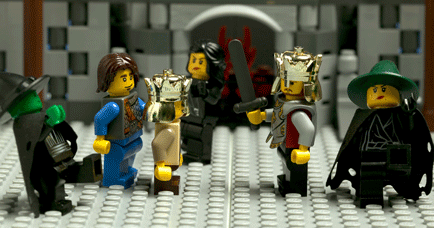
MACBETH (cont.)
For Banquo’s issue have I filed my mind;
For them the gracious Duncan have I murdered,
Put rancours in the vessel of my peace
Only for them, and mine eternal jewel
Given to the common enemy of man
To make them kings, the seeds of Banquo kings.
Rather than so, come fate into the list,
And champion me to th’utterance!—
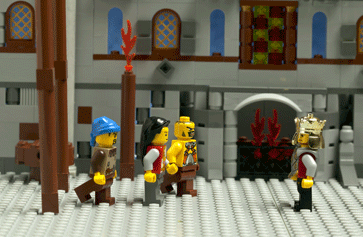
MACBETH (cont.)
Who’s there?
Now go to the door, and stay there till we call.
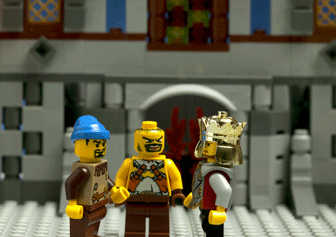
MACBETH (cont.)
Was it not yesterday we spoke together?
FIRST MURDERER
It was, so please Your Highness.
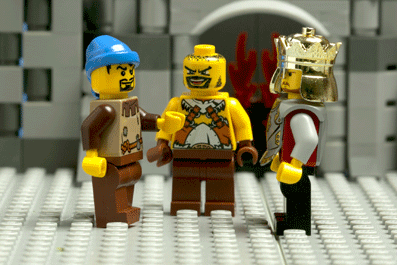
MACBETH
Well then, now
Have you considered of my speeches? Know
That it was he in the times past which held you
So under fortune, which you thought had been
Our innocent self. This I made good to you
In our last conference, passed in probation with you
How you were borne in hand, how crossed, the instruments,
Who wrought with them, and all things else that might
To half a soul and to a notion crazed
Say “Thus did Banquo.”
FIRST MURDERER
You made it known to us.
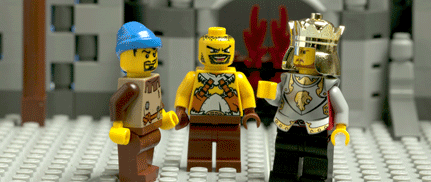
MACBETH
I did so, and went further, which is now
Our point of second meeting. Do you find
Your patience so predominant in your nature
That you can let this go? Are you so gospeled
To pray for this good man and for his issue,
Whose heavy hand hath bowed you to the grave
And beggared yours forever?

First Murderer
We are men, my liege.
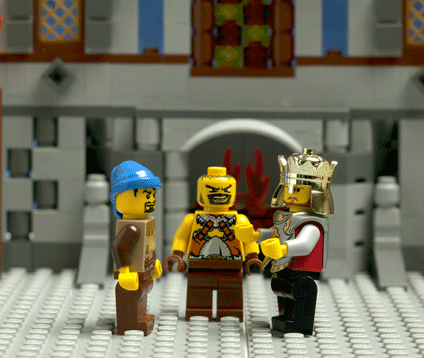
MACBETH
Ay, in the catalogue ye go for men,
As hounds and greyhounds, mongrels, spaniels, curs,
Shoughs, water-rugs, and demi-wolves are clept
All by the name of dogs. The valued file
Distinguishes the swift, the slow, the subtle,
The housekeeper, the hunter, every one
According to the gift which bounteous nature
Hath in him closed, whereby he does receive
Particular addition from the bill
That writes them all alike; and so of men.
Now, if you have a station in the file,
Not i’th’ worst rank of manhood, say’t;
And I will put that business in your bosoms
Whose execution takes your enemy off,
Grapples you to the heart and love of us,
Who wear our health but sickly in his life,
Which in his death were perfect.
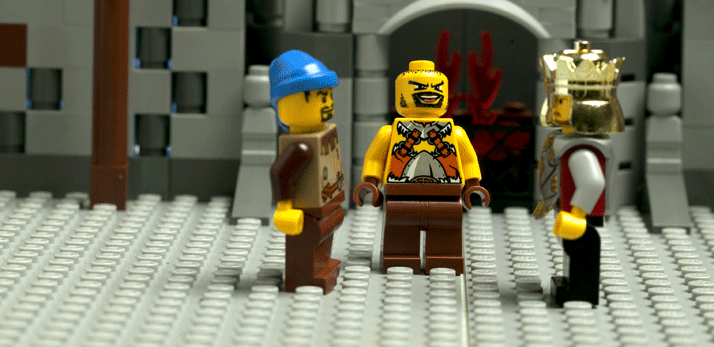
SECOND MURDERER
I am one, my liege,
Whom the vile blows and buffets of the world
Have so incensed that I am reckless what
I do to spite the world.
FIRST MURDERER
And I another
So weary with disasters, tugged with fortune,
That I would set my lie on any chance
To mend it or be rid on’t.
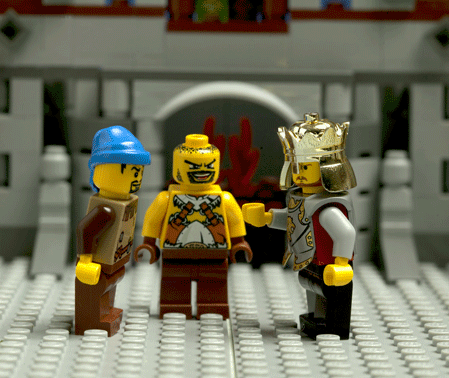
MACBETH
Both of you
Know Banquo was your enemy.
BOTH MURDERERS
True, my lord.
MACBETH
So is he mine, and in such bloody distance
That every minute of his being thrusts
Against my near’st of life. And though I could
With barefaced power sweep him from my sight
And bid my will avouch it, yet I must not,
For certain friends that are both his and mine,
Whose loves I may not drop, but wail his fall
Who I myself struck down. And thence it is
That I to your assistance do make love,
Masking the business from the common eye
For sundry weighty reasons.
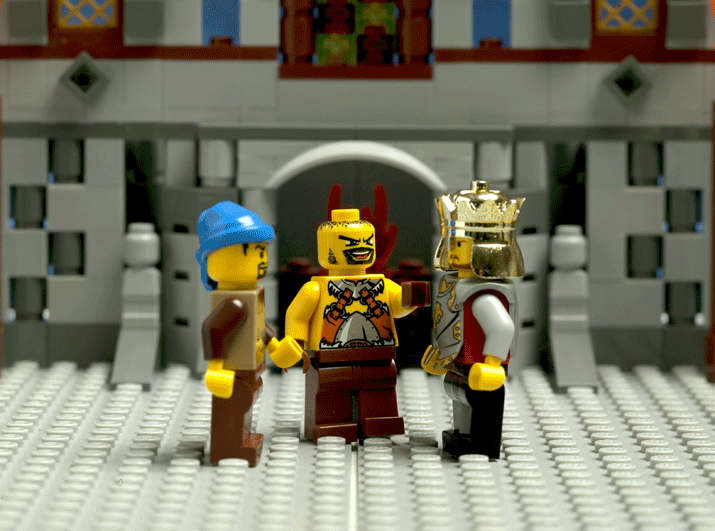
SECOND MURDERER
We shall, my lord,
Perform what you command us.
FIRST MURDERER
Though our lives—
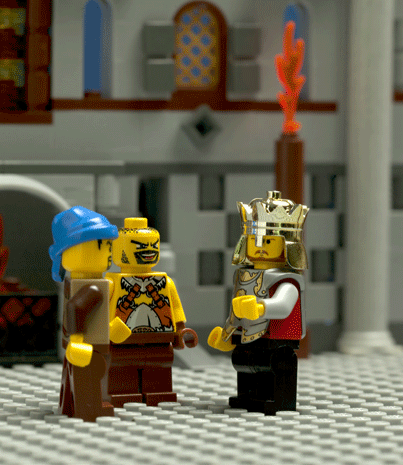
MACBETH
Your spirits shine through you. Within this hour at most
I will advise you where to plant yourselves,
Acquaint you with the perfect spy o’th’ time,
The moment on’t, for’t must be done tonight,
And something from the palace; always thought
That I require a clearness. And with him—
To leave no rubs nor botches in the work—
Fleance his son, that keeps him company,
Whose absence is no less material to me
Than is his father’s, must embrace the fate
Of that dark hour. Resolve yourselves apart;
I’ll come to you anon.
BOTH MURDERERS
We are resolved, my lord.
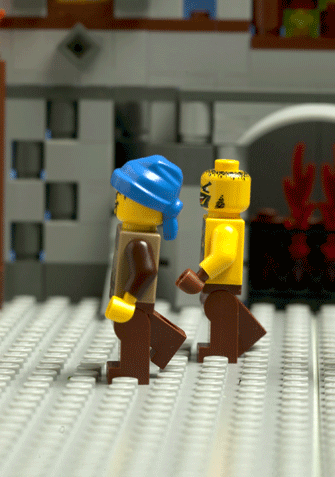
MACBETH
I’ll call upon you straight. Abide within.
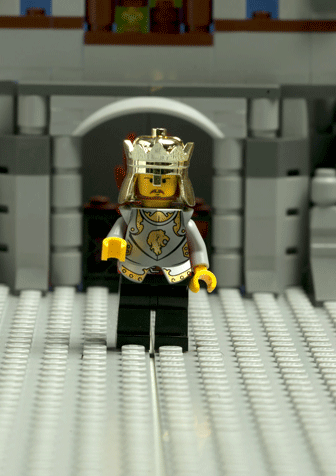
MACBETH (cont.)
It is concluded. Banquo, thy soul’s flight,
If it find heaven, must find it out tonight.
ACT III. Scene III (1–28).

After Macbeth plots to have Banquo killed, he and Lady Macbeth react quietly with one another to the results of their crime. Likening King Duncan’s throne to a snake, Macbeth comments to his wife that they have “scorched the snake, not killed it./She’ll close and be herself” (III.ii.15–16). In other words, though they have killed King Duncan, their plan was shortsighted and they are still vulnerable. Macbeth hints of his plans to kill Banquo but refuses to shed any more light on the plan, so that Lady Macbeth can applaud him when it is done.
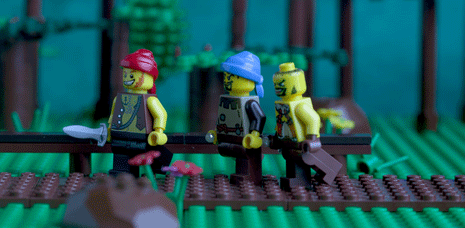
FIRST MURDERER
But who did bid thee join with us?
THIRD MURDERER
Macbeth.
SECOND MURDERER
He needs not our mistrust, since he delivers
Our offices and what we have to do
To the direction just.
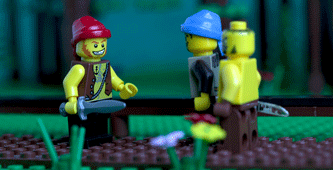
FIRST MURDERER
Then stand with us.
The west yet glimmers with some streaks of day:
Now spurs the lated traveler apace
To gain the timely inn, and near approaches
The subject of our watch.
THIRD MURDERER
Hark, I hear horses.
BANQUO
[Within] Give us a light there, ho!
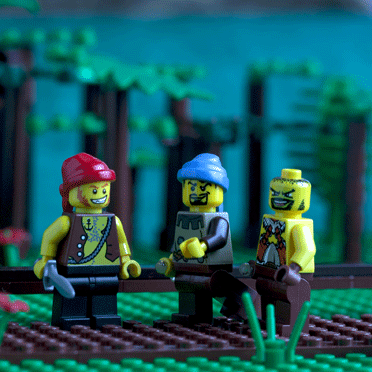
SECOND MURDERER
Then ’tis he. The rest
That are within the note of expectation
Already are i’th’ court.
FIRST MURDERER
His horses go about.

THIRD MURDERER
Almost a mile; but he does usually—
So all men do—from hence to th’ palace gate
Make it their walk.
SECOND MURDERER
A light, a light!

THIRD MURDERER
’Tis he.
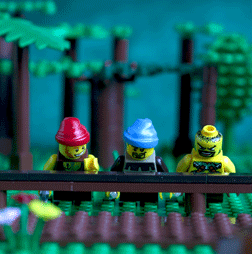
FIRST MURDERER
Stand to’t.

BANQUO
It will be rain tonight.

FIRST MURDERER
Let it come down!
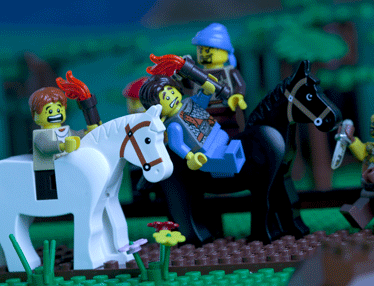
BANQUO
O, treachery! Fly, good Fleance, fly, fly, fly!
Thou mayst revenge. O slave!
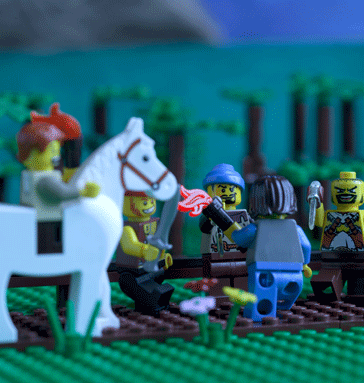
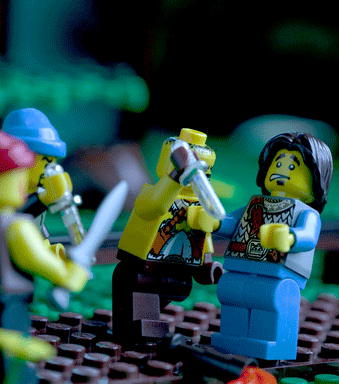
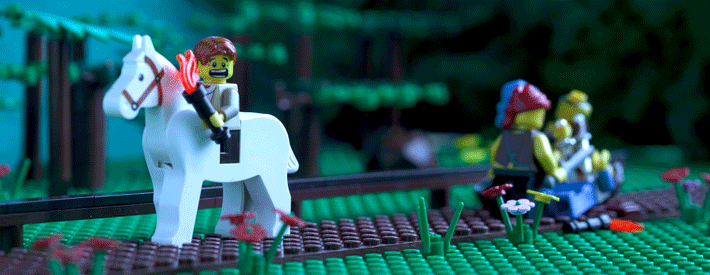
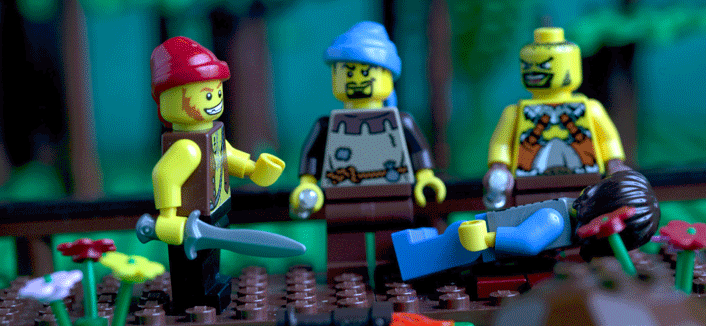
THIRD MURDERER
Who did strike out the light?
FIRST MURDERER
Was’t not the way?
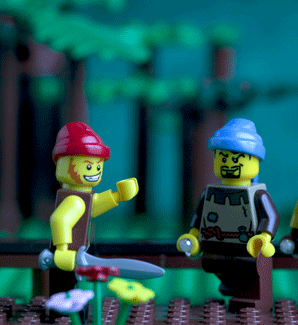
THIRD MURDERER
There’s but one down; the son is fled.
SECOND MURDERER
We have lost best half of our affair.
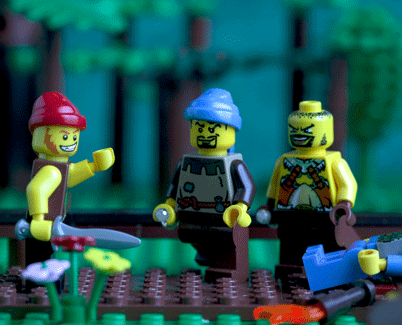
FIRST MURDERER
Well, let’s away and say how much is done.
ACT III. Scene IV (40–145).

The First Murderer shares the news with Macbeth that they have successfully killed Banquo, but that his son, Fleance, has fled. Macbeth thanks the murderer for killing Banquo but expresses concern that Fleance lives. While Fleance is young and harmless now, he is sure to grow up with vengeance for his father’s death heavy on his mind. For the time being, Macbeth decides to put his anxieties aside and proceed to the party he is hosting.
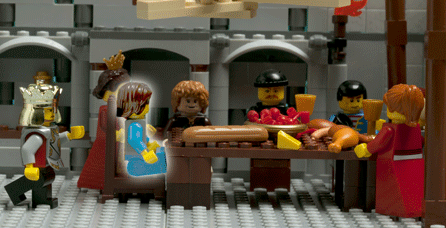
MACBETH
Here had we now our country’s honour roofed
Were the graced person of our Banquo present,
Who may I rather challenge for unkindness
Than pity for mischance.
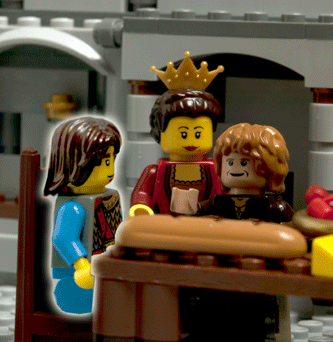
ROSS
His absence, sir,
Lays blame upon his promise. Please’t Your Highness
To grace us with your royal company?

MACBETH
The table’s full.

LENNOX
Here is a place reserved, sir.
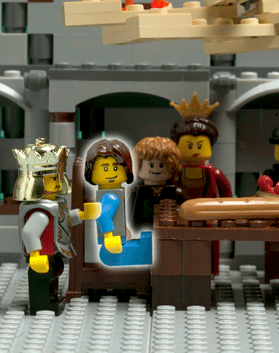
MACBETH
Where?
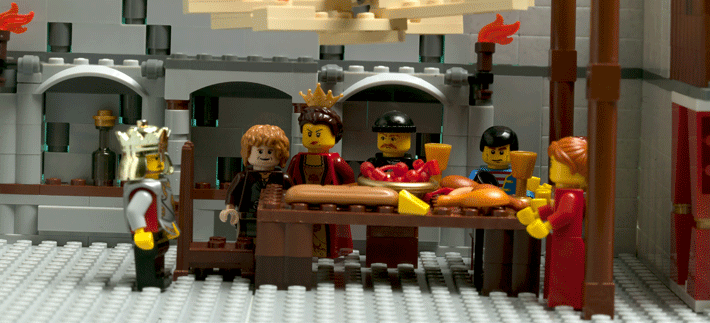
LENNOX
Here, my good lord. What is’t that moves
Your Highness?

MACBETH
Which of you have done this?

LORDS
What, my good lord?
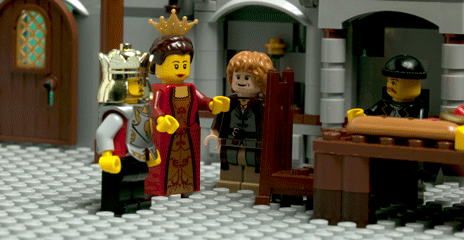
MACBETH
Thou canst not say I did it. Never shake
Thy gory locks at me.
ROSS
Gentlemen, rise. His Highness is not well.
LADY MACBETH
Sit, worthy friends. My lord is often thus,
And hath been from his youth. Pray you,
keep seat.
The fit is momentary; upon a thought
He will again be well. If much you note him
You shall offend him and extend his passion.
Feed, and regard him not.
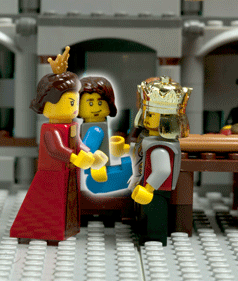
LADY MACBETH (cont.)
Are you a man?
MACBETH
Ay, and a bold one, that dare look on that
Which might appall the devil.
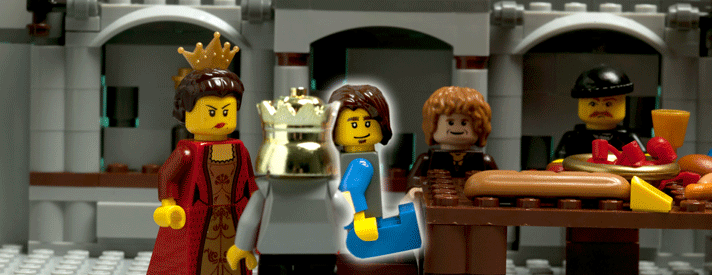
LADY MACBETH
O, proper stuff.
This is the very painting of your fear:
This is the air-drawn dagger which, you said,
Led you to Duncan. O, these flaws and starts,
Impostors to true fear, would well become
A woman’s story at a winter’s fire,
Authorized by her grandam. Shame itself!
Why do you make such faces? When all’s done,
You look but on a stool.
MACBETH
Prithee, see there!
Behold! look! Lo, how say you?—
Why, what care I? If thou canst nod, speak too.
If charnel houses and our graves must send
Those that we bury back, our monuments
Shall be the maws of kites.
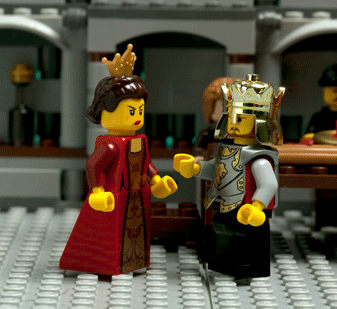
LADY MACBETH
What, quite unmanned in folly?
MACBETH
If I stand here, I saw him.
LADY MACBETH
Fie, for shame!
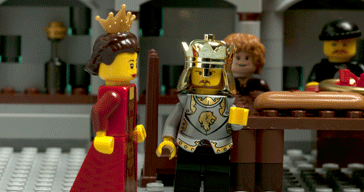
MACBETH
Blood hath been shed ere now, i’th’olden time,
Ere humane statute purged the gentle weal;
Ay, and since too, murders have been performed
Too terrible for the ear. The time has been
That, when the brains were out, the man would die,
And there an end; but now they rise again
With twenty mortal murders on their crowns,
And push us from our stools. This is more strange
Than such a murder is.
LADY MACBETH
My worthy lord,
Your noble friends do lack you.
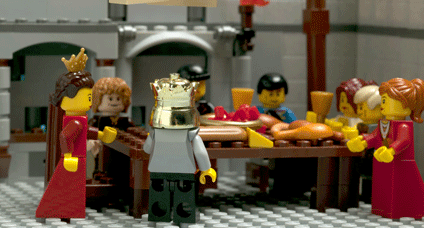
MACBETH
I do forget.
Do not muse at me, my most worthy friends;
I have a strange infirmity, which is nothing
To those that know me. Come, love and health to all!
Then I’ll sit down. Give me some wine. Fill full.

MACBETH (cont.)
I drink to th’ general joy o’th’ whole table,
And to our dear friend Banquo, whom we miss.
Would he were here! To all, and him, we thirst,
And all to all.
LORDS
Our duties and the pledge.
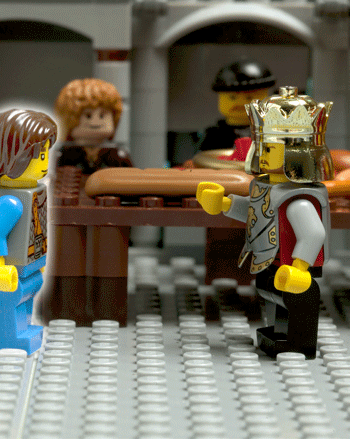
MACBETH
Avaunt, and quit my sight! Let the earth hide thee!
Thy bones are marrowless, thy blood is cold;
Thou hast no speculation in those eyes
Which thou dost glare with!
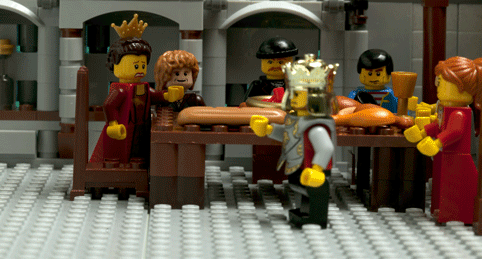
LADY MACBETH
Think of this, good peers,
But as a thing of custom. ’Tis no other;
Only it spoils the pleasure of the time.
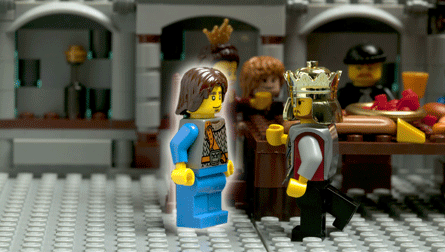
MACBETH
What man dare, I dare.
Approach thou like the rugged Russian bear,
The armed rhinoceros, or th’ Hyrcan tiger;
Take any shape but that, and my firm nerves
Shall never tremble. Or be alive again,
And dare me to the desert with thy sword.
If trembling I inhabit then, protest me
The baby of a girl. Hence, horrible shadow!
Unreal mockery, hence!
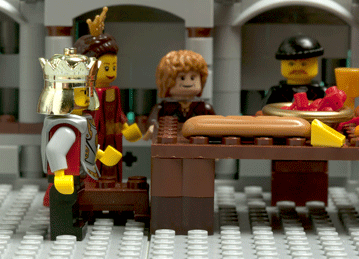
MACBETH (cont.)
Why, so; being gone,
I am a man again. Pray you, sit still.

LADY MACBETH
You have displaced the mirth, broke the good meeting
With most admired disorder.
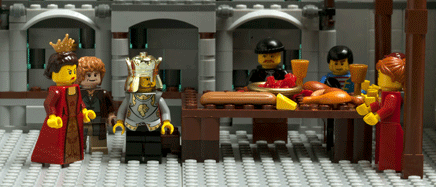
MACBETH
Can such things be,
And overcome us like a summer’s cloud,
Without our special wonder? You make me strange
Even to the disposition that I owe,
When now I think you can behold such sights
And keep the natural ruby of your cheeks
When mine is blanched with fear.

ROSS
What sights, my lord?
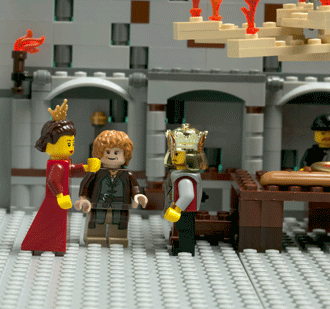
LADY MACBETH
I pray you, speak not. He grows worse and worse;
Question enrages him. At once, good night.
Stand not upon the order of your going,
But go at once.
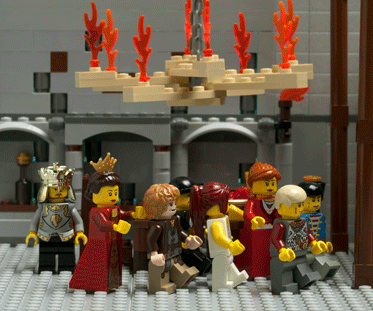
LENNOX
Good night, and better health
Attend His Majesty!
LADY MACBETH
A kind good night to all!

MACBETH
It will have blood, they say; blood will have blood.
Stones have been known to move and trees to speak;
Augurs and understood relations have
By maggotpies and choughs and rooks brought forth
The secret’st man of blood. What is the night?
LADY MACBETH
Almost at odds with morning, which is which.

MACBETH
How say’st thou, that Macduff denies his person
At our great bidding?

LADY MACBETH
Did you send to him, sir?
MACBETH
I hear it by the way; but I will send.
There’s not a one of them but in his house
I keep a servant fee’d. I will tomorrow—
And betimes I will—to the Weird Sisters.
More shall they speak, for now I am bent to know
By the worst means the worst. For mine own good
All causes shall give way. I am in blood
Stepped in so far that, should I wade no more,
Returning were as tedious as go o’er.
Strange things I have in head, that will to hand,
Which must be acted ere they may be scanned.

LADY MACBETH
You lack the season of all natures, sleep.
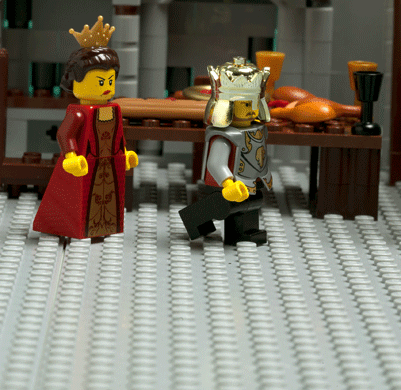
MACBETH
Come, we’ll to sleep. My strange and self-abuse
Is the initiate fear that wants hard use.
We are yet but young in deed.
ACT IV. Scene I (1–156).

The three witches assemble on a heath with Hecate, the Goddess of Witchcraft. Hecate scolds the Weird Sisters for having enlightened Macbeth to his prophecy, especially because his use of the knowledge has been destructive and self-serving. Hecate decides that they should appear to Macbeth in the coming day and provide him with an even greater spectacle of his fate, complete with a bubbling cauldron and magical illusions to further draw him in. Hecate hopes to elicit Macbeth’s hubris, allowing the witches’ prophecies to steer his dark sail to its own demise.
In the subsequent scene, Lennox and another Lord discuss the recent murders, and it becomes clear that they see through Macbeth’s guise of benevolence and loyalty to the prior throne. They reveal that King Edward of England has allowed King Duncan’s sons, Malcolm and Donalbain, to take refuge with him. Macduff has also gone to King Edward for assistance, but rather than refuge, he seeks to form an alliance and prepare a battle to free Scotland of Macbeth and his terrible reign.
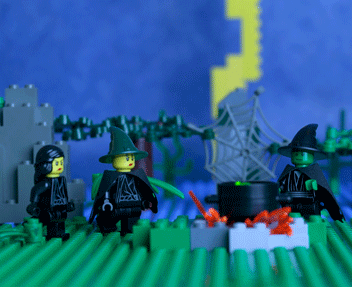
FIRST WITCH
Thrice the brinded cat hath mewed.
SECOND WITCH
Thrice, and once the hedge-pig whined.
THIRD WITCH
Harpier cries, “’Tis time, ’tis time!”
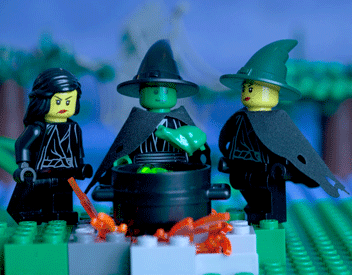
FIRST WITCH
Round about the cauldron go;
In the poisoned entrails throw.
Toad, that under cold stone
Days and nights has thirty-one
Sweltered venom sleeping got,
Boil thou first i’th’ charmed pot.
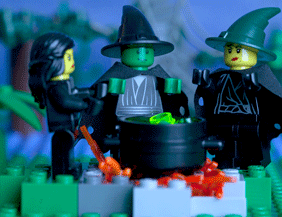
ALL
Double, double, toil and trouble;
Fire burn, and cauldron bubble.
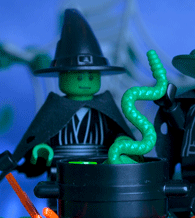
SECOND WITCH
Fillet of a fenny snake,
In the cauldron boil and bake;
Eye of newt and toe of frog,
Wool of bat and tongue of dog,
Adder’s fork and blindworm’s sting,
Lizard’s leg and owlet’s wing,
For a charm of powerful trouble,
Like a hell-broth boil and bubble.
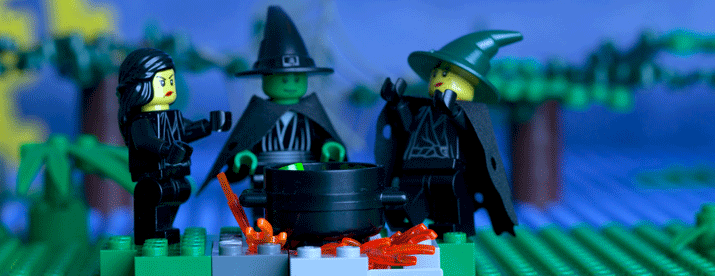
ALL
Double, double, toil and trouble;
Fire burn, and cauldron bubble.
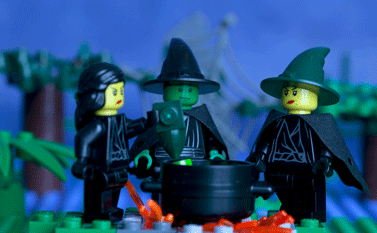
THIRD WITCH
Scale of dragon, tooth of wolf,
Witches’ mummy, maw and gulf
Of the ravined salt-sea shark,
Root of hemlock digged i’th’ dark,
Liver of blaspheming Jew,
Gall of goat, and slips of yew
Silvered in the moon’s eclipse,
Nose of Turk and Tartar’s lips,
Finger of birth-strangled babe
Ditch-delivered by a drab,
Make the gruel thick and slab.
Add thereto a tiger’s chaudron
For th’ingredience of our cauldron.
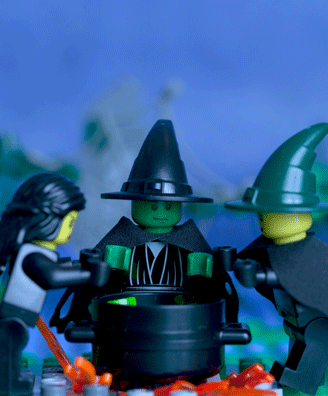
ALL
Double, double, toil and trouble;
Fire burn, and cauldron bubble.
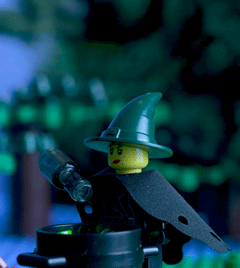
SECOND WITCH
Cool it with a baboon’s blood,
Then the charm is firm and good.
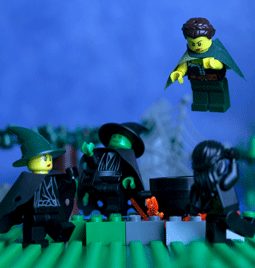
HECATE
O, well done! I commend your pains,
And every one shall share i’th’ gains.
And now about the cauldron sing
Live elves and fairies in a ring,
Enchanting all that you put in.
SECOND WITCH
By the pricking of my thumbs,
Something wicked this way comes.
Open, locks,
Whoever knocks!
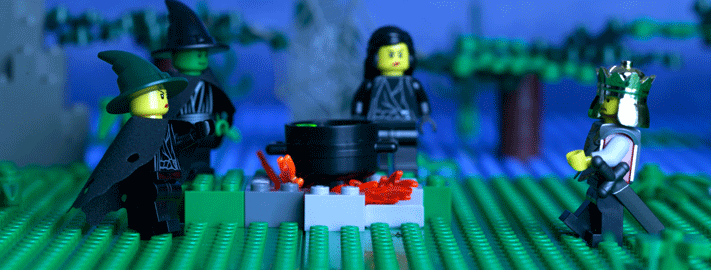
MACBETH
How now, you secret, black, and midnight hags!
What is’t you do?
ALL
A deed without a name.
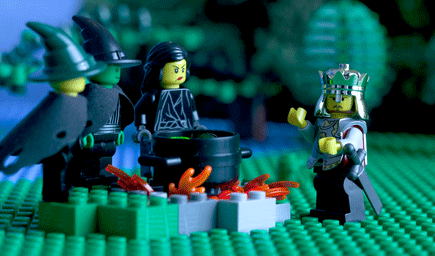
MACBETH
I conjure you, by that which you profess,
Howe’er you come to know it, answer me.
Though you untie the winds and let them fight
Against the churches, though the yeasty waves
Confound and swallow navigation up,
Though bladed corn be lodged and trees blown down,
Though castles topple on their warders’ heads,
Though palaces and pyramids do slope
Their heads to their foundations, though the treasure
Of nature’s germens tumble all together
Even till destruction sicken, answer me
To what I ask you.
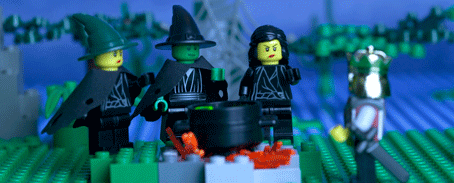
FIRST WITCH
Speak.
SECOND WITCH
Demand.
THIRD WITCH
We’ll answer.
FIRST WITCH
Say, if thou’dst rather hear it from our mouths
Or from our masters?
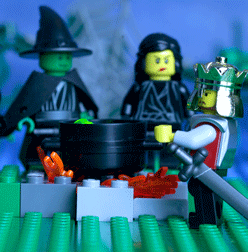
MACBETH
Call ’em. Let me see ’em.

FIRST WITCH
Pour in sow’s blood, that hath eaten
Her nine farrow; grease that’s sweaten
From the murderer’s gibbet throw
Into the flame.
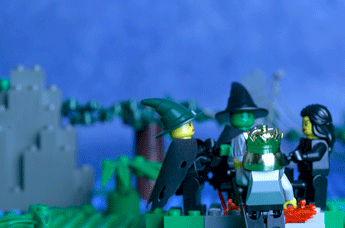
ALL
Come high or low;
Thyself and office deftly show!
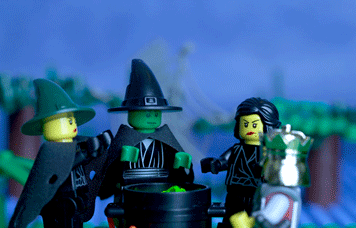
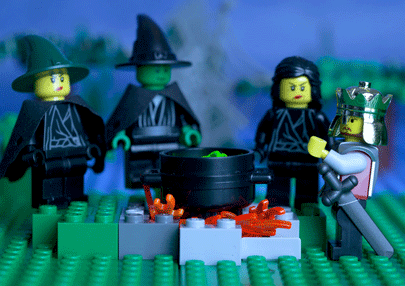
MACBETH
Tell me, thou unknown power—
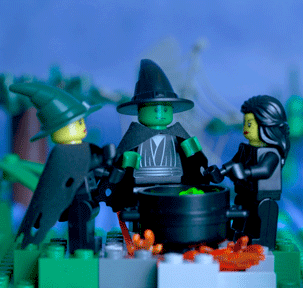
FIRST WITCH
He knows thy thought.
Hear his speech, but say thou naught.
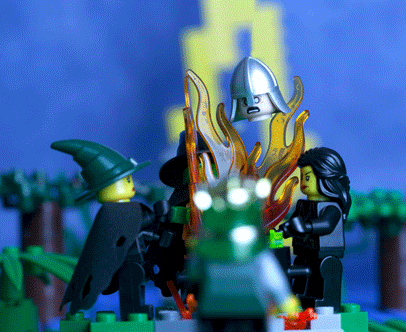
FIRST APPARITION
Macbeth! Macbeth! Macbeth! Beware Macduff,
Beware the Thane of Fife. Dismiss me. Enough.
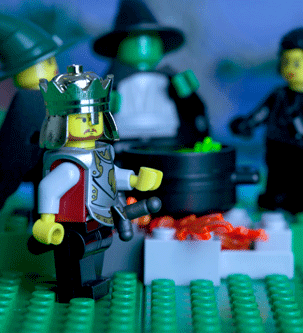
MACBETH
Whate’er thou art, for thy good caution, thanks;
Thou hast harped my fear aright. But one word more—

FIRST WITCH
He will not be commanded. Here’s another,
More potent than the first.
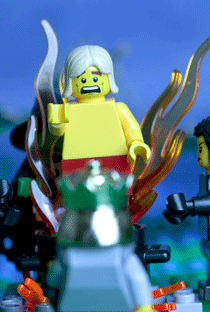
SECOND APPARITION
Macbeth! Macbeth! Macbeth!
MACBETH
Had I three ears, I’d hear thee.
SECOND APPARITION
Be bloody, bold, and resolute; laugh to scorn
The power of man, for none of woman born
Shall harm Macbeth.
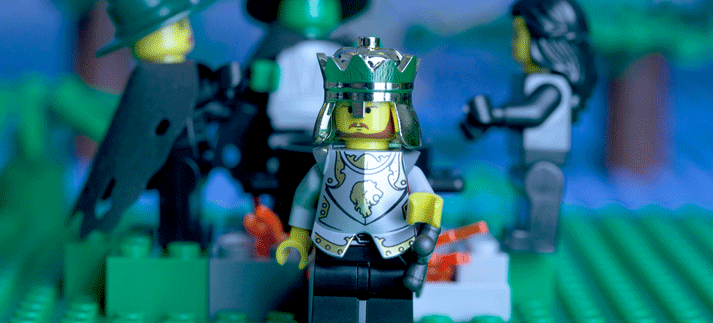
MACBETH
Then live, Macduff; what need I fear of thee?
But yet I’ll make assurance double sure,
And take a bond of fate. Thou shalt not live;
That I may tell pale-hearted fear it lies,
And sleep in spite of thunder.
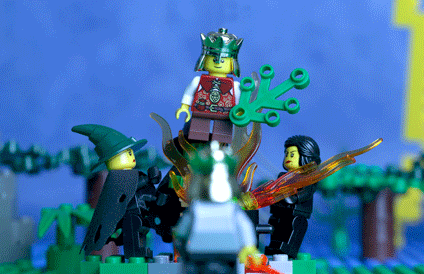
MACBETH (cont.)
What is this
That rises like the issue of a king
And wears upon his baby brow the round
And top of sovereignty?
ALL
Listen, but speak not to’t.
THIRD APPARITION
Be lion-mettled, proud; and take no care
Who chafes, who frets, or where conspirers are.
Macbeth shall never vanquished be until
Great Birnam Wood to high Dunsinane Hill
Shall come against him.

MACBETH
That will never be.
Who can impress the forest, bid the tree
Unfix his earthbound root? Sweet bodements, good!
Rebellious dead, rise never till the wood
Of Birnam rise, and our high-placed Macbeth
Shall live the lease of nature, pay his breath
To time and mortal custom. Yet my heart
Throbs to know one thing. Tell me, if your art
Can tell so much: shall Banquo’s issue ever
Reign in this kingdom?
ALL
Seek to know no more.
MACBETH
I will be satisfied. Deny me this,
And an eternal curse fall on you! Let me know.
Why sinks that cauldron? And what noise is this?
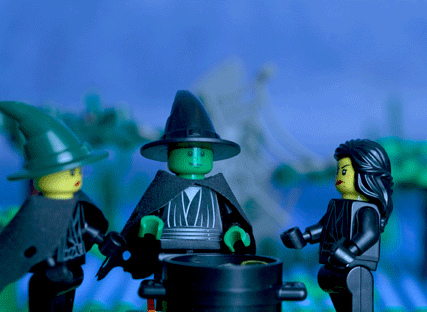
FIRST WITCH
Show!
SECOND WITCH
Show!
THIRD WITCH
Show!
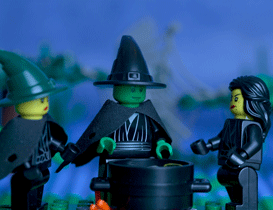
ALL
Show his eyes, and grieve his heart;
Come like shadows, so depart!

MACBETH
Thou art too like the spirit of Banquo. Down!
Thy crown does sear mine eyeballs. And thy hair,
Thou other gold-bound brow, is like the first.
A third is like the former. Filthy hags,
Why do you show me this? A fourth? Start, eyes!
What, will the line stretch out to th’ crack of doom?
Another yet? A seventh? I’ll see no more.
And yet the eighth appears, who bears a glass
Which shows me many more; and some I see
That two-fold balls and treble sceptres carry.
Horrible sight! Now, I see, ’tis true,
For the blood-boltered Banquo smiles upon me
And points at them for his.

MACBETH (cont.)
What, is this so?
FIRST WITCH
Ay, sir, all this is so. But why
Stands Macbeth thus amazedly?
Come, sisters, cheer we up his sprites,
And show the best of our delights.
I’ll charm the air to give a sound,
While you perform your antic round,
That this great king may kindly say,
Our duties did his welcome pay.

MACBETH
Where are they? Gone? Let this pernicious hour
Stand aye accursèd in the calendar!
Come in, without there!
LENNOX
What’s Your Grace’s will?
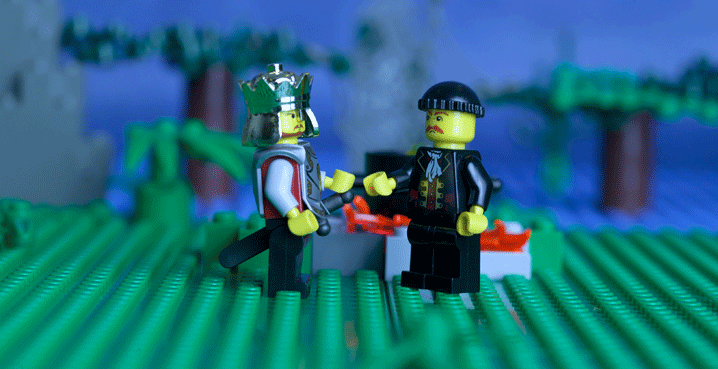
MACBETH
Saw you the Weird Sisters?
LENNOX
No, my lord.
MACBETH
Came they not by you?
LENNOX
No, indeed, my lord.
MACBETH
Infected be the air whereon they ride,
And damned all those that trust them! I did hear
The galloping of horse. Who was’t came by?
LENNOX
’Tis two or three, my lord, that bring you word
Macduff is fled to England.
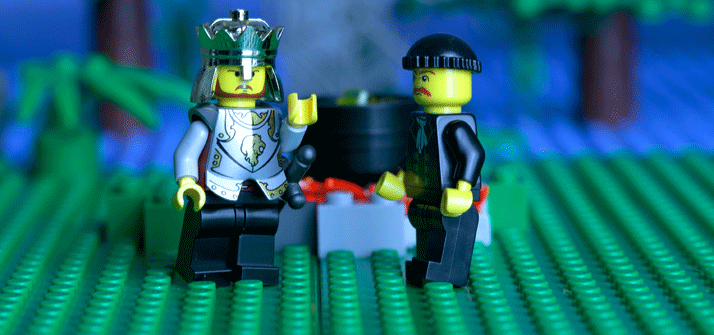
MACBETH
Fled to England!
LENNOX
Ay, my good lord.
MACBETH
Time, thou anticipat’st my dread exploits.
The flighty purpose never is o’ertook
Unless the deed go with it. From this moment
The very firstlings of my heart shall be
The firstlings of my hand. And even now,
To crown my thoughts with acts, be it thought and done:
The castle of Macduff I will surprise,
Seize upon Fife, give to th’edge o’th’ sword
His wife, his babes, and all unfortunate souls
That trace him in his line. No boasting like a fool;
This deed I’ll do before this purpose cool.
But no more sights!—Where are these gentlemen?
Come, bring me where they are.
ACT IV. Scene II (66–86).

Over at Macduff’s castle, Ross and Lady Macduff lament the absence of Macduff, who has fled to England for assistance. His abrupt journey casts an air of suspicion over him, making him look traitorous to his family and his country. Ross implores Lady Macduff to see the good in the situation and leaves before he can become too emotional. Lady Macduff is left to field the many questions her young son has for her about his father’s absence, what they will do without him, and what it means if he is in fact a traitor. They make jokes with one another to quell their growing anxiety, and it is at this point that they are interrupted by a messenger.
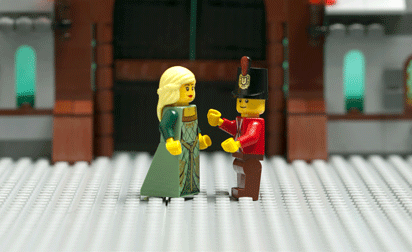
MESSENGER
Bless you, fair dame! I am not to you known,
Though in your state of honour I am perfect.
I doubt some danger does approach you nearly.
If you will take a homely man’s advice,
Be not found here. Hence, with your little ones.
To fright you thus, methinks, I am too savage;
To do worse to you were fell cruelty,
Which is too nigh your person. Heaven preserve you!
I dare abide no longer.
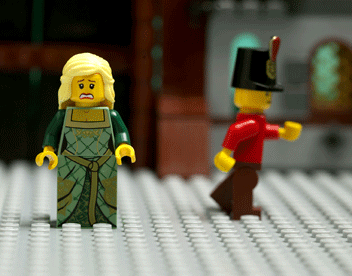
LADY MACDUFF
Whither should I fly?
I have done no harm. But I remember now
I am in this earthly world, where to do harm
Is often laudable, to do good sometime
Accounted dangerous folly. Why then, alas,
Do I put up that womanly defence
To say I have done no harm?

LADY MACDUFF (cont.)
What are these faces?
FIRST MURDERER
Where is your husband?

LADY MACDUFF
I hope in no place so unsanctified
Where such as thou mayst find him.
FIRST MURDERER
He’s a traitor.
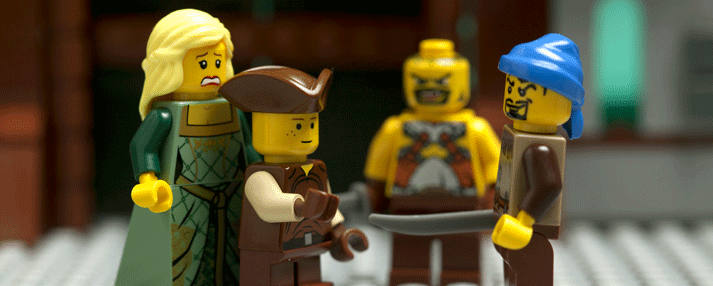
SON
Thou liest, thou shag-haired villain!
FIRST MURDERER
What, you egg?
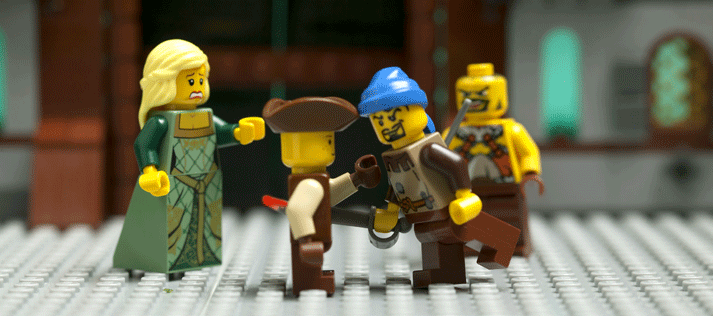
FIRST MURDERER (cont.)
Young fry of treachery!
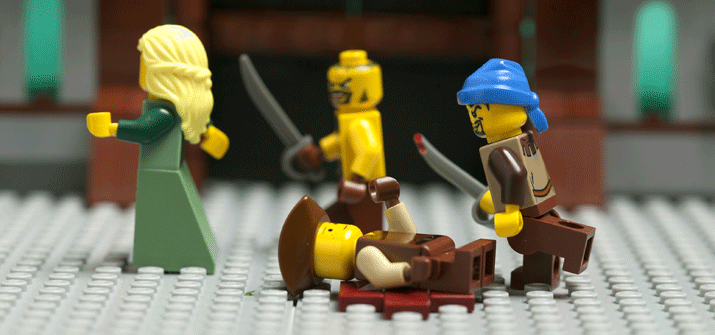
SON
He has killed me, mother.
Run away, I pray you!
ACT V. Scene I (1–80).

Malcolm and Macduff are in distress over the state of Scotland and Macbeth’s ever-worsening reign of slaughter. Macduff tries to encourage Malcolm to take his rightful seat on the throne, but as he does so, Malcolm tests Macduff’s motives by divulging heinous vices that could be worsened by kingly power. Macduff recoils in horror, rebuking Malcolm and saying that he must have been mistaken for thinking he should be the one to overthrow Macbeth. Malcolm is relieved by this reaction and assures Macduff that he is in fact virtuous and has the best interest of Scotland and its people in mind.
Ross joins the conversation and the three despair over the terrible crimes being committed under Macbeth’s rule. Alarmed, Macduff asks Ross if his family is okay, and Ross tries to appease him by saying that all are well in the Macduff castle. After some prodding, Ross reveals that Macduff’s entire family and household have been viciously murdered by Macbeth’s men. Overcome by the mayhem he has caused, the men resolve to bring the fight to Macbeth.
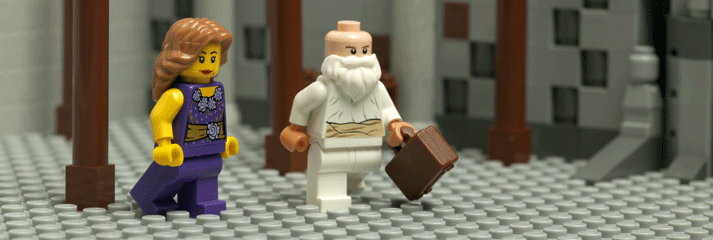
DOCTOR
I have two nights watched with you, but can
perceive no truth in your report. When was it she last
walked?
GENTLEWOMAN
Since his majesty went into the field, I
have seen her rise from her bed, throw her nightgown
upon her, unlock her closet, take forth paper, fold it,
write upon’t, read it, afterwards seal it, and again
return to bed; yet all this while in a most fast sleep.
DOCTOR
A great perturbation in nature, to receive at
once the benefit of sleep and do the effects of
watching! In this slumbery agitation, besides her
walking and other actual performances, what, at any
time, have you heard her say?
GENTLEWOMAN
That, sir, which I will not report after her.
DOCTOR
You may to me, and ’tis most meet you should.
GENTLEWOMAN
Neither to you nor any one; having no
witness to confirm my speech.
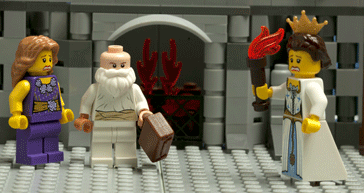
GENTLEWOMAN (cont.)
Lo you, here she comes! This is her very guise, and,
upon my life, fast asleep. Observe her. Stand close.
DOCTOR
How came she by that light?
GENTLEWOMAN
Why, it stood by her. She has light by
her continually. ’Tis her command.
DOCTOR
You see her eyes are open.
GENTLEWOMAN
Ay, but their sense are shut.
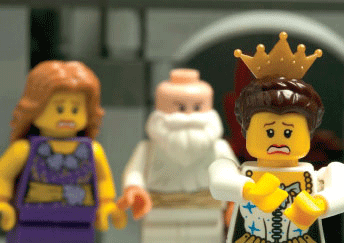
DOCTOR
What is it she does now? Look, how she rubs
her hands.
GENTLEWOMAN
It is an accustomed action with her to
seem thus washing her hands. I have known her
continue in this a quarter of an hour.
LADY MACBETH
Yet here’s a spot.
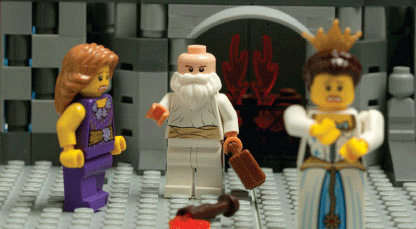
DOCTOR
Hark, she speaks: I will set down what comes
from her, to satisfy my remembrance the more
strongly.
LADY MACBETH
Out, damned spot! Out, I say! One—
Two—why then, ’tis time to do’t. Hell is murky.—
Fie, my lord, fie, a soldier, and afeard? What need we
fear who knows it, when none can call our power to
account? Yet who would have thought the old man to
have had so much blood in him?

DOCTOR
Do you mark that?
LADY MACBETH
The Thane of Fife had a wife. Where is
she now?—What, will these hands ne’er be
clean?—No more o’that, my lord, no more o’that;
you mar all with this starting.
DOCTOR
Go to, go to. You have known what you
should not.
GENTLEWOMAN
She has spoke what she should not, I
am sure of that. Heaven knows what she has known!
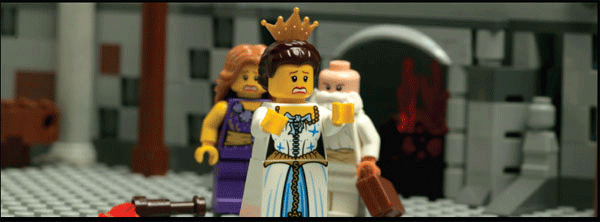
LADY MACBETH
Here’s the smell of the blood still. All the perfumes
of Arabia will not sweeten this little hand.
Oh, oh, oh!
DOCTOR
What a sigh is there! The heart is sorely charged.
GENTLEWOMAN
I would not have such a heart in my
bosom for the dignity of the whole body.
DOCTOR
Well, well, well.
GENTLEWOMAN
Pray God it be, sir.
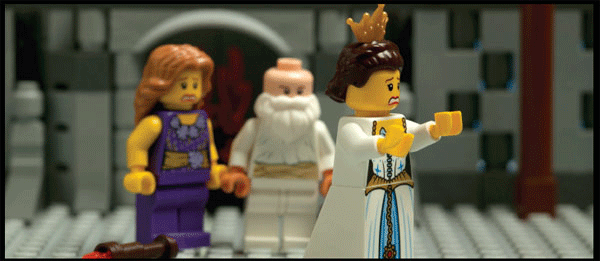
DOCTOR
This disease is beyond my practice. Yet I have
known those which have walked in their sleep who
have died holily in their beds.
LADY MACBETH
Wash your hands, put on your night-
gown; look not so pale! I tell you yet again,
Banquo’s buried. He cannot come out on ’s grave.
DOCTOR
Even so?
LADY MACBETH
To bed, to bed! There’s knocking at the
Gate. Come, come, come, come, give me your hand.
What’s done cannot be undone. To bed, to bed, to bed!
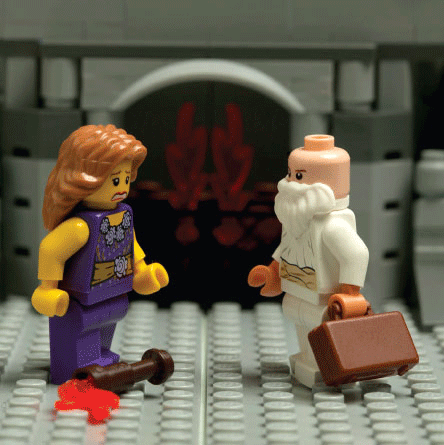
DOCTOR
Will she go now to bed?
GENTLEWOMAN
Directly.
DOCTOR
Foul whisperings are abroad: unnatural deeds
Do breed unnatural troubles. Infected minds
To their deaf pillows will discharge their secrets.
More needs she the divine than the physician.
God, God forgive us all! Look after her;
Remove from her the means of all annoyance,
And still keep eyes upon her. So, good night.
My mind she has mated, and amazed my sight.
I think, but dare not speak.
GENTLEWOMAN
Good night, good doctor.
ACT V. Scene VI (1–10).

With the coming help of the English, the leaders of the Scottish forces begin the march toward Dunsinane Hill to overthrow Macbeth. They profess their allegiance to the rightful heir to the throne, Malcolm, and wonder about Macbeth’s violent psychosis. They lead the march to Birnam Wood.
Meanwhile, at Dunsinane, Macbeth is learning that Scottish thanes are abandoning him in loyalty to Malcolm. Despite this, Macbeth is confident that he will not be overthrown, because the witches’ prophecy said that such could only happen if Birnam Wood were to move from its current location to the palace, which of course is impossible. More than ten thousand English soldiers assemble outside in preparation for a fight.
Out at Birnam Wood, Malcolm, Siward, and their men plot their approach to the castle. Malcolm decides to camouflage the soldiers by having them carry branches from the forest, which will confuse Macbeth and his men as to how many men they are up against.
Up at Dunsinane, Macbeth is given two reports of bad news. Lady Macbeth has died from her paranoid insanity, and the forest has seemingly moved to the foot of the palace. Macbeth waves off his wife’s death and becomes horrorstruck and angry at the news that Birnam Wood has shifted locations. The ostensibly impossible prophecy that Macbeth should only worry if the forest moves has come true.

MALCOLM
Now near enough. Your leafy screens throw down,
And show like those you are. You, worthy uncle,
Shall with my cousin, your right noble son,
Lead our first battle. Worthy Macduff and we
Shall take upon ’s what else remains to do,
According to our order.
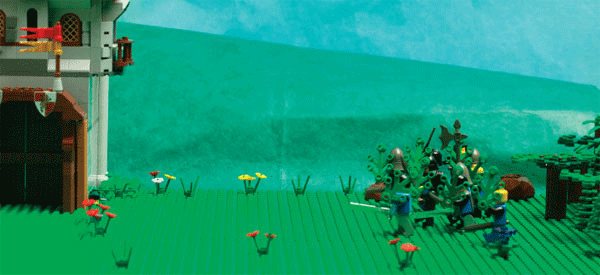
SIWARD
Fare you well.
Do we but find the tyrant’s power tonight,
Let us be beaten, if we cannot fight.
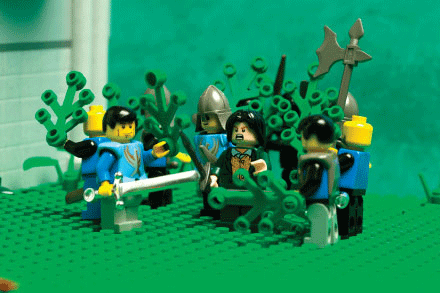
MACDUFF
Make all our trumpets speak! Give them all breath,
Those clamorous harbingers of blood and death!
ACT V. Scene VII (1–30).

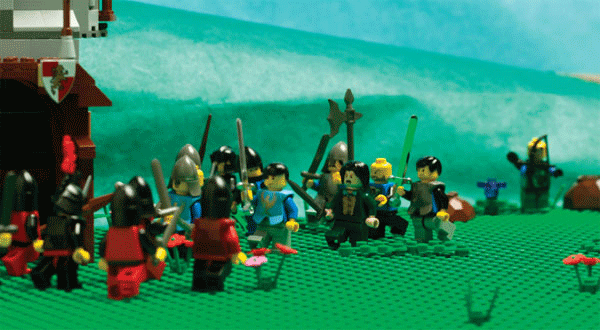

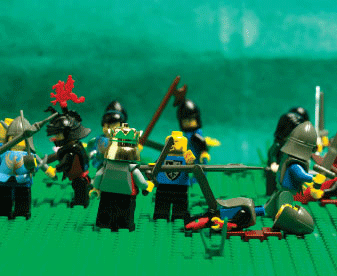
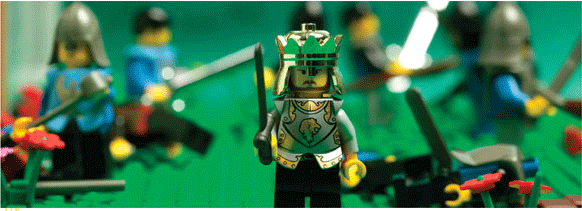
MACBETH
They have tied me to a stake. I cannot fly,
But bearlike I must fight the course. What’s he
That was not born of woman? Such a one
Am I to fear, or none.
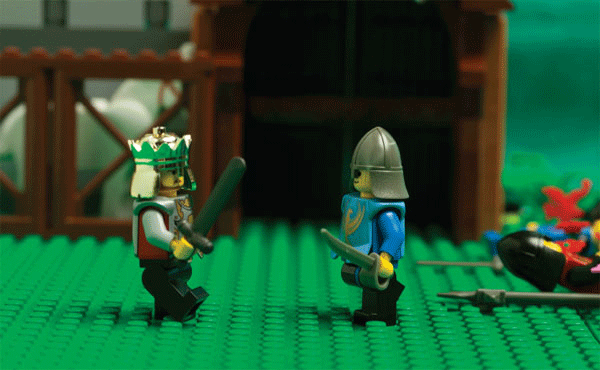
YOUNG SIWARD
What is thy name?
MACBETH
Thou’lt be afraid to hear it.
YOUNG SIWARD
No, though thou call’st thyself a hotter name
Than any is in hell.
MACBETH
My name’s Macbeth.
YOUNG SIWARD
The devil himself could not pronounce a title
More hateful to mine ear.
MACBETH
No, nor more fearful.
YOUNG SIWARD
Thou liest, abhorrèd tyrant. With my sword
I’ll prove the lie thou speak’st.
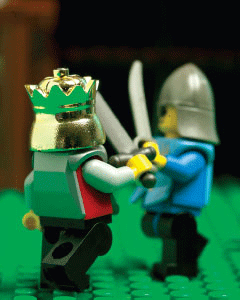
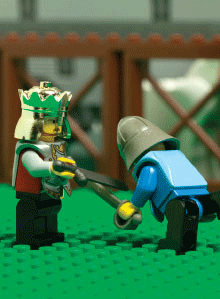
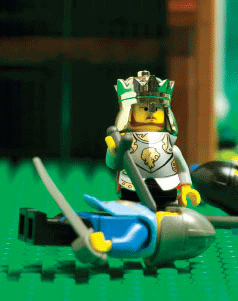
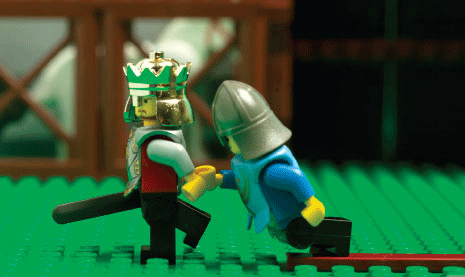
MACBETH
Thou wast born of woman
But swords I smile at, weapons laugh to scorn,
Brandished by man that’s of a woman born.

MACDUFF
That way the noise is. Tyrant, show thy face!
If thou be’st slain, and with no stroke of mine,
My wife and children’s ghosts will haunt me still.
I cannot strike at wretched kerns, whose arms
Are hired to bear their staves. Either thou, Macbeth,
Or else my sword with an unbattered edge
I sheathe again undeeded. There thou shouldst be;
By this great clatter one of greatest note
Seems bruited. Let me find him, Fortune!
And more I beg not.
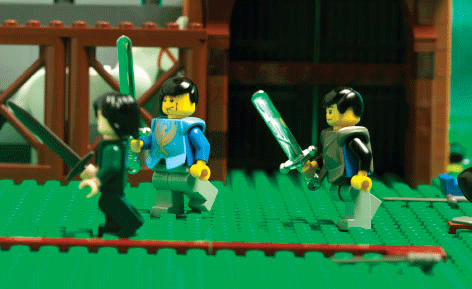
SIWARD
This way, my lord. The castle’s gently rendered:
The tyrant’s people on both sides do fight,
The noble thanes do bravely in the war,
The day almost itself professes yours,
And little is to do.
MALCOLM
We have met with foes
That strike beside us.
SIWARD
Enter, sir, the castle.
ACT V. Scene VIII (1–76).


MACBETH
Why should I play the Roman fool, and die
On mine own sword? Whiles I see lives, the gashes
Do better upon them.

MACDUFF
Turn, hellhound, turn!
MACBETH
Of all men else I have avoided thee.
But get thee back. My soul is too much charged
With blood of thine already.
MACDUFF
I have no words;
My voice is in my sword, thou bloodier villain
Than terms can give thee out!
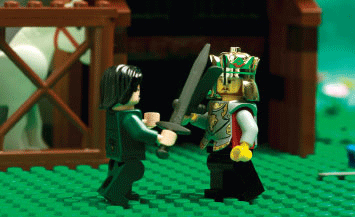
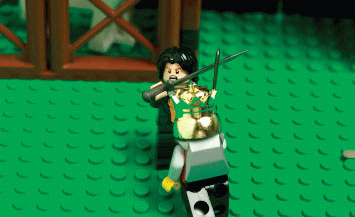
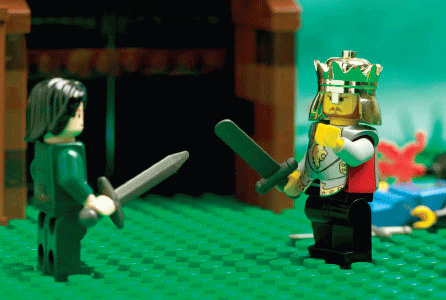
MACBETH
Thou losest labour.
As easy mayst thou the intrenchant air
With thy keen sword impress as make me bleed.
Let fall thy blade on vulnerable crests;
I bear a charmèd life, which must not yield,
To one of woman born.
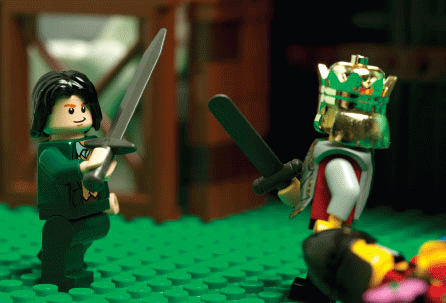
MACDUFF
Despair thy charm,
And let the angel whom thou still hast served
Tell thee, Macduff was from his mother’s womb
Untimely ripped.
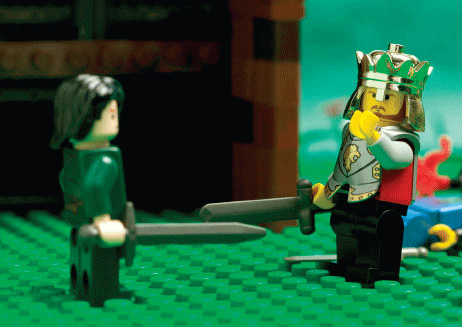
MACBETH
Accursèd be that tongue that tells me so,
For it hath cowed my better part of man!
And be these juggling fiends no more believed
That palter with us in a double sense,
That keep the word of promise to our ear
And break it to our hope. I’ll not fight with thee.
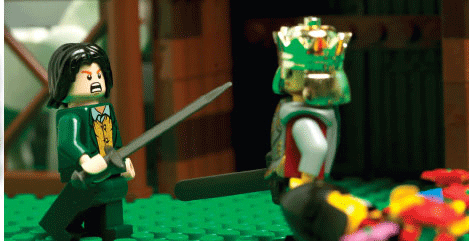
MACDUFF
Then yield thee, coward,
And live to be the show and gaze o’th’ time!
We’ll have thee, as our rarer monsters are,
Painted on a pole, and underwrit,
“Here may you see the tyrant.”
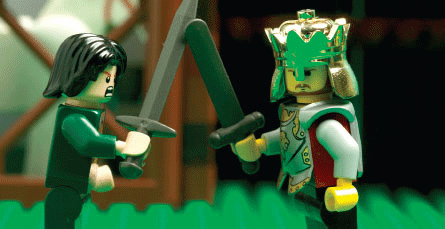
MACBETH
I will not yield,
To kiss the ground before young Malcolm’s feet
And to be baited with the rabble’s curse.
Though Birnam Wood be come to Dunsinane,
And thou opposed, being of no woman born,
Yet I will try the last. Before my body
I throw my warlike shield. Lay on, Macduff,
And damned be him that first cries, “Hold, enough!”
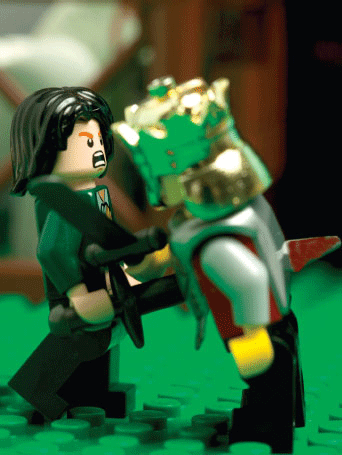
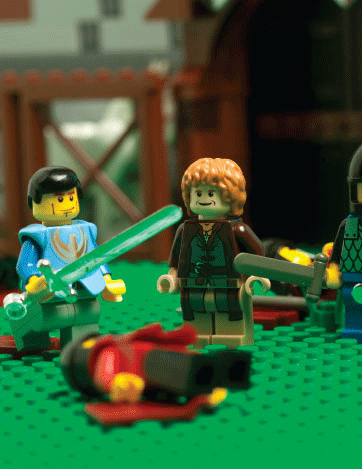
MALCOLM
I would the friends we miss were safe arrived.
SIWARD
Some must go off; and yet, by these I see
So great a day as this is cheaply bought.
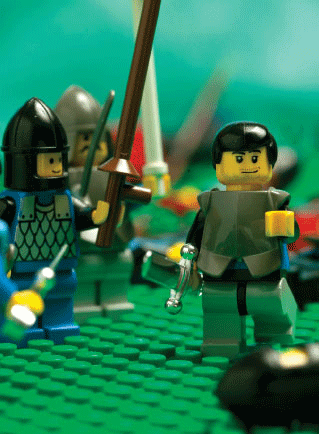
MALCOLM
Macduff is missing, and your noble son.

ROSS
Your son, my lord, has paid a soldier’s debt.
He only lived but till he was a man,
The which no sooner had his prowess confirmed
In the unshrinking station where he fought,
But like a man he died.
SIWARD
Then he is dead?
ROSS
Ay, and brought off the field. Your cause of sorrow
Must not be measured by his worth, for then
It hath no end.
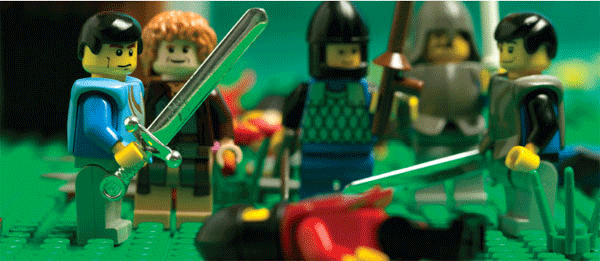
SIWARD
Had he his hurts before?
ROSS
Ay, on the front.
SIWARD
Why then, God’s soldier be he!
Had I as many sons as I have hairs,
I would not wish them to a fairer death.
And so, his knell is knolled.
MALCOLM
He’s worth more sorrow,
And that I’ll spend for him.
SIWARD
He’s worth no more
They say he parted well and paid his score,
And so, God be with him! Here comes newer comfort.
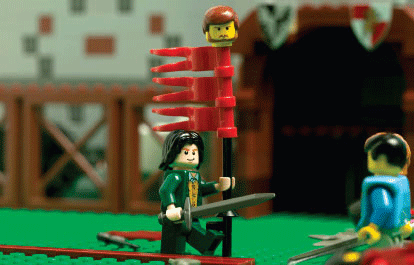
MACDUFF
Hail, King! For so thou art. Behold where stands
The usurper’s cursèd head. The time is free.
I see thee compassed with thy kingdom’s pearl,
That speak my salutation in their minds,
Whose voices I desire aloud with mine:
Hail, King of Scotland!
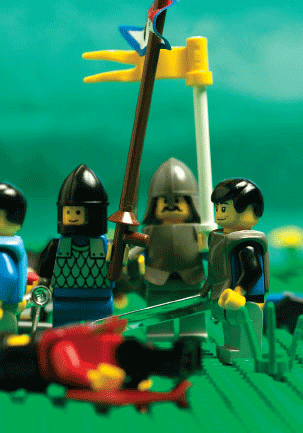
ALL
Hail, King of Scotland!
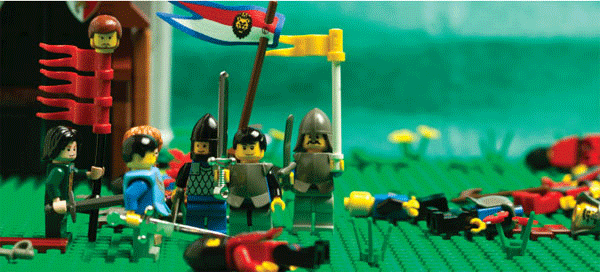
MALCOLM
We shall not spend a large expense of time
Before we reckon with your several loves
And make us even with you. My thanes and kinsmen,
Henceforth be earls, the first that ever Scotland
In such an honour named. What’s more to do
Which would be planted newly with the time,
As calling home our exiled friends abroad
That fled the snares of watchful tyranny,
Producing forth the cruel ministers
Of this dead butcher and his fiendlike queen—
Who, as ’tis thought, by self and violent hands
Took off her life—this, and what needful else
That calls upon us, by the grace of Grace
We will perform in measure, time, and place.
So, thanks to all at once and to each one,
Whom we invite to see us crowned at Scone.